democracynow.org
Stories:

Privatization on Steroids: Emergency Manager Who Switched Flint Water Resigns from Detroit Schools
Congress is holding its first hearing today on lead poisoning in the water supply of Flint, Michigan. The crisis began after an unelected emergency manager appointed by Republican Governor Rick Snyder switched the source of Flint’s drinking water to the corrosive Flint River. Flint’s former emergency manager, Darnell Earley, refused to testify at today’s hearing despite a subpoena from the U.S. House Oversight and Government Reform Committee. On Tuesday, Earley announced he was resigning from his current position as emergency manager of the Detroit Public Schools. One person that will be testifying is Snyder’s handpicked appointee to run the state Department of Environmental Quality, Keith Creagh. According to the Detroit Free Press, Creagh is expected to fault the federal Environmental Protection Agency for contributing to the Flint crisis, saying it "did not display the sense of urgency that the situation demanded."
TRANSCRIPT
This is a rush transcript. Copy may not be in its final form.
JUAN GONZÁLEZ: Congress is holding its first hearing today on lead poisoning in the water supply of Flint, Michigan. The crisis began after an unelected emergency manager appointed by Republican Governor Rick Snyder switched the source of Flint’s drinking water to the corrosive Flint River. Flint’s former emergency manager, Darnell Earley, refused to testify at today’s hearing despite a subpoena from the U.S. House Oversight and Government Reform Committee. On Tuesday, Earley announced he was resigning from his current position as emergency manager of the Detroit Public Schools.
One person that will be testifying is Snyder’s handpicked appointee to run the state Department of Environmental Quality, Keith Creagh. According to the Detroit Free Press, Creagh is expected to fault the federal Environmental Protection Agency for contributing to the Flint crisis, saying it, quote, "did not display the sense of urgency that the situation demanded."
AMY GOODMAN: While many Michigan residents have called on Michigan Governor Rick Snyder to resign over the crisis, he was not asked to testify at today’s hearing. Newly discovered emails show Michigan officials began trucking clean water to a state building in the city of Flint last January, long before admitting to residents the water was poisoned. Progress Michigan, which obtained the emails, told Mother Jones they "blow a hole in the governor’s timeline for when they knew or started to have concerns about Flint water." On Tuesday, Flint Mayor Karen Weaver called for Flint’s lead-contaminated pipes to be replaced.
To talk more about Flint and also the resignation of the Detroit Public Schools emergency manager, Darnell Earley, who was the emergency manager for Flint as the water got contaminated, we’re joined by two guests. Thomas Stephens is with us, member of Detroiters Resisting Emergency Management, an attorney who has long been involved in the environmental justice movement, also a member of the National Lawyers Guild. And we’re joined by Tawanna Simpson, an elected member of the Detroit Board of Education.
Before we talk about Darnell Earley, the emergency manager who has just left his position as head of the Detroit Public Schools, we are going to turn to Thomas Stephens to talk about these latest developments around Flint: a congressional hearing, Darnell Earley refusing to testify—he was subpoenaed late yesterday—and this news of the Michigan state building getting water more than a year ago—this was well before Governor Snyder says they knew that there was a problem with the Flint water. Talk about the significance of all of this.
THOMAS STEPHENS: Good morning, Amy. Thanks for having us on.
Yes, this story just keeps getting bigger and bigger and more and more shocking. You mentioned a couple of the points. And the question, I think, on everybody’s mind is: How could they do this? How could they—once the water started flowing in April of 2014, and it was brown and yellow and tasted bad and smelled bad and gave people chemical burns, how could they possibly allow it to continue for 18 months and take no action? And then, even then, even since then, since October of 2015, their action has been perhaps the clumsiest cover-up that I’ve ever seen in my life. And I think that it’s reached the stage where the governor’s supporters are trying to narrow the question to: Well, who was responsible for the decision to withdraw water from the Flint River? And who was responsible for the failure to include anticorrosive chemicals in that water?
And I think it’s really important for people, as these congressional hearings begin and the finger-pointing between the EPA and the state Department of Environmental Quality and the state officials and the emergency managers and the local officials in Flint gains momentum, for people to realize that there’s a broader historical significance, in that in the 1990s, when for a brief period of time it seemed like there might be some relief in the offing from the environmental authorities for environmental racism, that there was a presidential order in the Clinton administration, early in the Clinton administration, on environmental justice, and there was a draft guidance by the EPA—I think it was in the late '80s—that began the process of responding to this disproportionate and adverse environmental risk and contamination that low-income, people of color communities, in particular, are exposed to. And it was in Flint, where, with the Republican governor, the previous Republican governor, John Engler, and his DEQ director, Russell Harding, leading the charge, the EPA and the DEQ and the state of Michigan decided, no, we're not going to provide the kind of protection these communities need to have the kind of environment and public health that are enjoyed in white communities. And in particular, in what’s known as the infamous Select Steel decision, the EPA, under enormous political pressure from both Democrats and Republicans in Congress threatening to cut their funding, determined that they weren’t going to even apply a civil rights analysis.
It’s kind of a long and complicated story, and it requires an understanding of how civil rights and environmental regulation and public health intersect. But the important thing for people to realize is that this is not—the reason why the good explanation for what the Snyder administration did is unbelievable incompetence is because, actually, this was the policy they put in place 25 years ago.
JUAN GONZÁLEZ: And in terms of policy, this whole issue of water supplies, privatizing water supplies, the decision to switch from the water supply by the Detroit water system, talk about the privatization efforts that have been occurring.
THOMAS STEPHENS: Sure. And, you know, you’re in a state where this governor instituted the emergency management policy, which is like privatization on steroids, total privatization of government. Right? And we have in southeastern Michigan two new water authorities: what’s called the Karegnondi Water Authority in Flint, which is still digging a trench and laying pipe to Lake Huron, and the Great Lakes Water Authority, which has taken over all of the old infrastructure and operations of the Detroit Water and Sewerage Department. And while these authorities are being created, you have poisoning of the poor people of color community in Flint, and you have mass water shutoffs—also in violation of the human right to water and sanitation—in Detroit. So people can draw their own conclusions. I mean, what’s happening is the resource, the very essence of life itself, water, is being privatized and being subjected to a corporate bottom-line approach that is in violation of the human rights of the people, the most vulnerable people, in the state.
AMY GOODMAN: But can you explain—I mean, a lot has been made of, has been said about the Detroit switch, the emergency manager’s decision to take Flint off the Detroit water supply and, as an interim measure before moving to a new system, just take the Flint water, that that was done to save water [sic]. But you’re investigating something else—the possibility that it was done, what, to bankrupt the Detroit public water system—you know, they were getting money to provide the Flint water—so that it could be privatized?
THOMAS STEPHENS: Well, you said "save water"; I think you meant "save money." And it’s not quite that conspiratorial. I mean, remember, both Flint and Detroit were under state-appointed emergency managers, accountable only to the governor and empowered to override contracts and laws. And during the same time period, they approved—and there’s a story in The Detroit News today that provides new details, according to participants, of behind-the-scenes meetings between the governor himself, the emergency managers and the water authorities in Detroit and Flint.
And the decision to start a new water authority in Flint and invest all the money and resources that is involved in that kind of an operation and the construction—they still haven’t finished the pipe to Lake Huron—and the decision to cut it off, the Detroit Water and Sewerage Department system, which is now the Great Lakes Water Authority, at a cost of, I think it was, about $12 million a year to that system, makes no economic sense. From the perspective of emergency management, which is supposed to be about fiscal integrity of the municipalities, which, as I’m sure you’ll hear from Tawanna in a little while, in the Detroit Public Schools hasn’t exactly worked out, it makes no sense to start a new authority and deprive the existing system of revenue. Right?
So, the question is: Why did they do that? It probably comes down—it almost certainly comes down to the economic and political power that local officials get. And I’m talking about in the Flint area, Genesee County, which was still on the Detroit system, by the way, where the white, suburban Genesee County was still getting good water from Detroit the whole time. If you can build a system like this, and then you control development, right? Somebody wants to—owns a lot of property and wants to do a development and make a lot of money by creating a residential suburb out of it or whatever and selling the property, they need water and drainage. So if you have control over that in your area, you have an immense source of power and money. And I think that’s what’s behind it. And if Governor Snyder is ever tied to that in Genesee County, he will be—that will be the end of his career.
JUAN GONZÁLEZ: Well, I’d like to turn to Tawanna Simpson. You’re an elected member of the Detroit Board of Education, but obviously you’ve had extremely limited power, because the school system has been under emergency management of the very same person, Darnell Earley, who was implicated in what’s occurred in Flint. Could you talk about what emergency management has meant to your school system, and your response to the resignation of Earley?
TAWANNA SIMPSON: Yes. Good morning. I’d like to give you a little history. Detroit Public Schools has been under a form of emergency management since 1999. At that time, we had a $1.5 billion bond, a $93 million rainy day fund, when Governor Engler took—first took over our public schools. So, we know it’s about money. Emergency management is about taking over our schools, causing—suspending democracy and not educating our children in Detroit.
AMY GOODMAN: I wanted to turn to Detroit public school student Wisdom Morales describing the conditions in his Detroit public school.
WISDOM MORALES: I’ve gotten used to seeing rats everywhere. I’ve gotten used to seeing the dead bugs. I’ve tried to ignore all the graffiti when I’m trying to use the bathroom. But any way it goes, still, I’m still bothered by these things. And it makes me feel sick, and it doesn’t feel good. ... I want to be able to go to school and not have to worry about being bitten by mice, being knocked out by the gases, being cold in the rooms.
AMY GOODMAN: That’s Wisdom Morales speaking to reporter Kate Levy, who produced the piece for Detroit Public Schools for Democracy Now!, which you can link to at our website. But, Tawanna, if you can explain? I mean, teachers have been sicking out, major protests. These conditions—you’ve got the Flint water supply contaminating the children of Flint, and then you’ve got these conditions in the Detroit Public Schools under the same manager, emergency—unelected emergency manager, who just quit.
TAWANNA SIMPSON: It’s very disheartening. It’s overwhelming. It’s really sad that democracy is suspended here in Detroit. And, you know, it’s heartbreaking. I was—just went on a tour not too long ago and was actually locked out of a section of the school, because they didn’t want the school board members to see the deplorable conditions inside of Spain Middle School. And to watch, you know, preschoolers in class with their coats on and having to play in a hallway instead of being able to go into a gym is very disheartening.
JUAN GONZÁLEZ: You’re saying that you, as an elected school board member, were locked out of a public school that you’re supposedly in charge of?
TAWANNA SIMPSON: Yes, a section of the building. Yes, I was.
JUAN GONZÁLEZ: Well, Thomas Stephens, what about this whole issue of emergency management across the board in Michigan, the reality that almost all of the communities that are being under emergency management are largely African-American and Latino?
THOMAS STEPHENS: Yeah. It’s a racist policy. And under the emergency management statute, the elected school board in Detroit has no power at all. The emergency manager has all the power. They only have the power that he chooses to give them, and he’s given them none. And, you know, this is why I’m in a group called Detroiters Resisting Emergency Management, that formed out of the appointment of Kevyn Orr in Detroit in March and April of 2013, is because, you know, the Flint River catastrophe is really the realization of our fears. The idea that—and this goes back to that environmental justice experience in the '90s that I referred to earlier, too. The idea that a white Republican governor in Lansing appointing a single individual—of whatever race—to, you know, run a city, without accountability to anybody except the governor and with the power to override laws and contracts, was bound to be harmful to these communities. And it's turned out to be, unfortunately, for—especially for the children of Flint and also the children of the Detroit Public Schools, even more harmful than we feared.
AMY GOODMAN: So, Tawanna Simpson, what are you calling for now? You have Darnell Earley. He just quit. He’s been subpoenaed to testify before this, well, Republican congressional committee, that is not calling for Governor Snyder or for the others responsible for the Flint water supply, but Darnell Earley is, who was the emergency manager in charge of the Flint water, now Detroit Public Schools, and he’s just left, but he says he’s not testifying. So what’s going to happen to your school? Has a new emergency manager been appointed? What are you demanding for the Detroit Public Schools?
TAWANNA SIMPSON: Well, what I demand for the Detroit Public Schools is to return the elected school board. Give them—give us our power back. Let us educate our students. Let us rebuild our school district. That’s what I’m calling for. No DEC. The governor is proposing to provide an additional layer of bureaucracy by creating another board that would govern charter schools, public schools and the EAA. It’s just ludicrous. Nowhere—nowhere in America would you find three competing companies working together. So, you know, by making education—providing choices, that also creates competition. And so, we don’t want to be a part of a DEC. P.A. 436 says that after the locals return to governance, that there will be a fiduciary board in place. So the law already provides for oversight. So we don’t want a DEC or any other level of bureaucracy. We want in Detroit Public Schools what every other public school in the state of Michigan have: an elected school board that elects their superintendent and governs their district.
AMY GOODMAN: Well, I want to thank you both for being with us. And, of course, we’ll continue to follow the story and cover the congressional hearing today on Flint’s water supply. I want to thank Tawanna Simpson, who has joined us from Detroit, elected member of the Detroit Board of Education. And thanks so much to Thomas Stephens—
THOMAS STEPHENS: Thank you, Amy.
AMY GOODMAN: —with Detroiters Resisting Emergency Management.
This is Democracy Now! When we come back, who’s responsible for printing that fake New York Times that was distributed all over New York yesterday? You’ll find out.
... Read More →
Jewish Peace Groups Reveal Role in Spoof New York Times That Criticized Paper's Stance on Israel
A Palestinian village has been awarded the Nobel Peace Prize. Israel is throwing open its doors to refugees. Those were some of the headlines that appeared in a fake version of The New York Times distributed across New York City on Tuesday. The paper carried the slogan "All the news we didn’t print." The prank copy of the revered "Gray Lady" also announced Democratic presidential candidate "Hilarity Clifton" planned to quit the presidential race to head up a women’s nonprofit based in Ramallah. The edition even has fake ads. Volunteers distributed 10,000 copies of the fake paper, but no group took responsibility—until now. Jane Hirschmann of Jews Say No! tells Democracy Now! her group and Jewish Voice for Peace produced the paper. We speak to Hirschmann and Ben Norton, journalist at Salon.
TRANSCRIPT
This is a rush transcript. Copy may not be in its final form.
JUAN GONZÁLEZ: A Palestinian village has been awarded the Nobel Peace Prize. Israel is throwing open its doors to refugees. Those were some of the headlines that appeared in a fake version of The New York Times distributed across New York City on Tuesday. The paper carried the slogan "All the News We Didn’t Print." The prank copy of the revered "Gray Lady" also announced Democratic presidential candidate "Hilarity Clifton" planned to quit the presidential race to head up a women’s nonprofit based in Ramallah. The edition even has fake ads.
AMY GOODMAN: Ten thousand copies of the fake paper were distributed, but no group took responsible for the prank—that is, until now. Joining us to find out who was behind the paper, we’re joined by Jane Hirschmann of Jews Say No! Also with us, Ben Norton, journalist at Salon who specializes in U.S. foreign policy and in the Middle East. He just published a piece titled "Progressive Jewish groups make New York Times parody issue to protest newspaper’s 'biased Israel-Palestine coverage.'"
Now, Jane, it begins—above the New York Times logo, it says, "Rethinking Our 2015 Coverage on Israel-Palestine—A Supplement" Who are Jews Say No! in New York, and why did you do this?
JANE HIRSCHMANN: Well, it wasn’t just Jews Say No! in New York. There were two groups that came together—our group, Jews Say No!, and also Jewish Voice for Peace in New York City. And we’re two organizations that are trying very hard to get out the real news about Israel and Palestine.
The media bias is extraordinary. And months ago, we came together to discuss: What can we do about this, the fact that the coverage never has any context to what’s going on in Israel and Palestine? People are not aware that there’s a 67-year occupation, that they’re not two equal peoples. The press—and it’s not just The New York Times, it’s really all the press. They always typecast the Palestinians as the terrorists, and the poor Israelis are the victims. And we felt that the time had come to really put out the news, the real news, about it.
People don’t know that our government is complicit, that we give $3 billion a year to Israel. And we don’t give it for social services, for education, for research; we give it to them for military reasons. It’s the largest contribution we make to any country in the world. So we’re funding the occupation. People don’t know there’s an apartheid-like state in Israel. And we worked for months to get out this paper. And yes, it’s a parody, but all the facts about Israel and Palestine on the ground are correct in the paper.
JUAN GONZÁLEZ: Well, you know, I’m sure that many of the people in The New York Times would say that they provide some of the most balanced coverage, although, you know, obviously, you might differ with that. But some of the articles are really amazing. You had a headline, "I.D.F. Generals Blame Israeli Government for Recent Violence." And you even had the advertisements, as well, all dealing with a political reversal of how people here in the United States, many, are fed the news on Israel and Palestine.
JANE HIRSCHMANN: Well, actually, some of the generals did come forward recently and did question what the Israeli government was doing and that it may be the cause for the violence. That’s what they questioned in The New York Times. And we’re saying that after 67 years of violence, of stealing people’s homes, people’s water, you know, not letting them a cross border, have checkpoints to go to work, not getting to hospitals, that this is violent. And even the generals—that article is pretty factual about the generals.
JUAN GONZÁLEZ: What was the reaction when you gave it out on the streets yesterday?
JANE HIRSCHMANN: It was really amazing. We had over 60 volunteers at places like Staten Island Ferry and, you know, Grand Central. And people took the paper and said, "Thank you." And my first paper that I handed out at 7:00 in the morning, this guy left, and a minute later, he came back, and he said, "Who did this?" And, of course, we didn’t reveal. And then he said, "This is fabulous. This is the news we never see." He said, "I’m a teacher, and I teach about media and terrorism. And I’m going to teach today. Can you give me more copies?"
AMY GOODMAN: You also have a fake editorial of The New York Times in this four-page supplement. And this, Ben, is one of the quotes you pulled for your Salon piece. You write, "In addition, we are aware"—this is the fake editorial. "In addition, we are aware that a disproportionate number of our news stories in the past year and a half have focused on Israeli government statements and positions or the views of Israeli Jewish citizens; only a small fraction have featured Palestinian speakers, whether officials and advocates or residents who experience the effects of Israeli policies in everyday life." This, Ben Norton, is—was the clip that you chose for your piece in Salon to lay out where the Times says they’re going with this, though it was fake, of course.
BEN NORTON: Thanks for having me. It’s great to be here.
Well, I think—as Jane said, I think it’s important to recognize that The New York Times is not necessarily unique in these regards. Rather, I think, as the U.S. newspaper of record, it epitomizes this kind of tendency throughout American media. And essentially, the idea is, you know, Israel is a very close U.S. ally, Israel is a democracy, etc., so we need to give their side of the view the vast majority of the time. And what that does is it normalizes this notion that Palestinians are violent, and they’re reacting against, you know, this more civilized, democratic country. And when you look at the media coverage, very often what you see is, you know, you’ll see quotes from Israeli government officials—sometimes they’re anonymous—and at most there will be one or two quotes from a Palestinian. And even then, the quotes will be very timid and paltry, and you won’t see any kind of quotes that discuss, for instance, the brutality of the military occupation. You won’t see any discussion, in any kind of significant detail, of Israel’s illegal activities.
And as Jane had mentioned, when we’re talking about context, context in media is everything. And The New York Times and many other publications very often refuse to acknowledge that there has been an illegal military occupation of the occupied Palestinian territories since 1967. The U.S. and all countries in the world, excluding Israel, have admitted this. The New York Times rarely acknowledges, for instance, that—when they’re discussing the recent wave of violence, that more than 165 Palestinians have been killed since October. You know, in a few months, we’re talking about approximately 170 deaths. And, in fact, a few minutes ago, just this morning—I was looking at the headlines—three more Palestinians were killed in occupied East Jerusalem.
So, when we’re looking at this kind of coverage, it’s important to understand that when American newspapers quote Israeli government officials, when American newspapers kind of don’t acknowledge the daily, quotidian violence and oppression that Palestinians are subjected to, that, right there, it’s a subtle but very clear form of bias that must be overcome. This whole notion of having balanced coverage is, of course, very important, but what it often actually means is it normalizes and essentially creates an equivalency between the people who are under military occupation, and have been illegally for decades, and the people who are carrying out that illegal military occupation. And any media that make that clear delineation are actually being balanced. If you don’t make that delineation, you’re not being balanced, you’re normalizing violence.
JUAN GONZÁLEZ: Jane, I wanted to ask you—there were two pieces that were not parodies. They were op-ed pieces by Leila Said and by Aurora Levins Morales. I’m wondering if you could talk about them and the decision to include them, as well, in this issue.
JANE HIRSCHMANN: Well, we thought it was important to put in pieces—as you said, the whole paper is not a parody. There are facts that are absolutely correct. And we thought that it was important to put in pieces—actually, there’s only one person that’s named correctly in this paper, and that’s Aurora. But we wanted to make it accurate, as well. We didn’t want it to just be a joke paper. We wanted to show what real coverage would look like. And so, we did that.
And I also want to mention what Ben said. You know, when an Israeli child is killed, they have a whole story about that child. They have a picture of that child. They tell you about the family, you know. So we listed the Palestinian children who were recently killed, and grown-ups, because we thought it was important to get their names into—you never see it in the papers at all.
AMY GOODMAN: Also, U.N. Secretary-General Ban Ki-moon actually did write a strongly worded New York Times op-ed criticizing Israel’s continued occupation of the West Bank and Gaza.
JANE HIRSCHMANN: Right, right.
AMY GOODMAN: But I also wanted to ask you about the ads.
JANE HIRSCHMANN: Yes.
AMY GOODMAN: On the front page, we’re used to seeing, you know, various ads.
JANE HIRSCHMANN: Yes.
AMY GOODMAN: "The Perfume of Power." And it says, "Eau de I.D.F. Skunk." Can you say what it says underneath?
JANE HIRSCHMANN: You know, I can’t read what it says underneath, because I don’t have my glasses, sorry. Ben, can you or somebody read it?
BEN NORTON: So, it is a fake ad for perfume, you know, "Eau de I.D.F," water of the IDF, or perfume. And it says, "Since 2008, the Israeli Defense Forces (I.D.F.) have routinely sprayed toxic 'skunk water' on and into Palestinian homes and schools. Its smell has been described as 'worse than raw sewage' and 'like a mixture of excrement, noxious gas and a decomposing donkey.'"
JANE HIRSCHMANN: One of my children—
AMY GOODMAN: True?
JANE HIRSCHMANN: Yeah, this is true.
BEN NORTON: Absolutely.
JANE HIRSCHMANN: One of my children was at Bil’in when they sprayed skunk. And it was horrific. And, you know, people got very, very ill. One person has died. This is what they spray to disperse the crowds.
BEN NORTON: And it’s important to recognize also, for instance, Bassem Tamimi is an outspoken nonviolent Palestinian activist in the occupied West Bank, and he has discussed how they also spray it into homes.
JANE HIRSCHMANN: Yes.
BEN NORTON: And what they do is they sometimes break windows—this is Israeli occupation forces—they will break windows and spray skunk water into people’s homes, which ruins their furniture, which makes their house smell horrific for weeks. And if it gets in your hair, it can be stuck—that smell can be stuck for months.
AMY GOODMAN: Did you get a response from The New York Times? I mean, the paper, aside from the headlines and the content, looks exactly like The New York Times.
JANE HIRSCHMANN: Yes, yes. Well, they were quoted. We didn’t call them for the quotes. But all our sites have been taken down—our Facebook, our Twitter—
AMY GOODMAN: By?
JANE HIRSCHMANN: —and even our domain. Well, we’re not exactly sure. The domain, we know, because they were called by The New York Times and threatened, so they took it down. We will be up and running again today. We will not be stopped. And we’ll let your viewers know, through you, how to see the paper online, because right now nobody can see it. We were taken down.
AMY GOODMAN: Well, I want to thank you both for being with us, as Jews Say No! and Jewish Voice for Peace New York City reveals they’re behind the fake New York Times that was distributed yesterday throughout the city, 10,000 copies made. Jane Hirschmann of Jews Say No! and Ben Norton, journalist at Salon who’s written about this, and the piece has just gone up.
This is Democracy Now! When we come back, Michael Eric Dyson joins us to talk about The Black Presidency: Barack Obama and the Politics of Race in America. Stay with us.
... Read More →
Michael Eric Dyson on The Black Presidency: Barack Obama and the Politics of Race in America
As the 2016 presidential race heats up and the nation marks Black History Month, we turn to look back on President Obama’s legacy as the nation’s first African-American president. Georgetown professor Michael Eric Dyson has just published a new book titled The Black Presidency: Barack Obama and the Politics of Race in America. From the protests in Ferguson to the church shooting in Charleston, South Carolina, to the controversy over the arrest of Harvard professor Henry Louis Gates, Michael Eric Dyson explores how President Obama has changed how he talks about race over the past seven years.
Watch Part 2 of our interview with Michael Eric Dyson
TRANSCRIPT
This is a rush transcript. Copy may not be in its final form.
JUAN GONZÁLEZ: As the 2016 presidential race heats up and the nation marks Black History Month, we turn to look back on President Obama’s legacy as the nation’s first African-American president. Georgetown professor Michael Eric Dyson has just published a new book titled The Black Presidency: Barack Obama and the Politics of Race in America.
AMY GOODMAN: From the protests in Ferguson to the church shooting in Charleston, South Carolina, to the controversy over the arrest of Harvard professor Henry Louis Gates, Michael Eric Dyson explores how President Obama has changed how he talks about race over the past seven years. He is joining us here in New York.
Welcome back to Democracy Now! It’s great to have you with us—
MICHAEL ERIC DYSON: Thanks for having me. Always great to be on.
AMY GOODMAN: —Professor Dyson.
MICHAEL ERIC DYSON: Thank you.
AMY GOODMAN: So, why don’t you talk about why you wrote The Black Presidency?
MICHAEL ERIC DYSON: Well, I wanted to weigh in on how race has been used against Obama, how he’s used it, how he’s avoided it, how obstruction has been racially pitched but not often explicitly articulated. And the stuff that is explicitly articulated has been pretty rancid, but even the more subtle stuff has to be taken into account. And his hesitation, his procrastination, when it came to racial discourse, I think, hurt the nation in ways that were certainly unintended, but nonetheless very important to note. And to look at his presidency in the broader landscape, if you will, of both the resistance he faced and the self-imposed gag order on race that he certainly observed for most of his presidency, and to look at the evolution of Obama on race, from the bad lesson he learned after the Gates-gate, which was "don’t say anything about race, because folk get real mad." Well, they get mad when you say—
AMY GOODMAN: When Harvard professor—
MICHAEL ERIC DYSON: Harvard professor Henry Louis Gates.
AMY GOODMAN: —Henry Louis Gates was arrested in—
MICHAEL ERIC DYSON: Was arrested, that’s right.
AMY GOODMAN: —as he was walking into his own home.
MICHAEL ERIC DYSON: His own home, and went on the porch, and then they arrested him. So, the reality is, is that after that kind of, you know, sustained argument for a week about whether or not Obama should have weighed in as the policeman being—acting stupidly, he pretty much, from then, was kind of chill on race. And I think it had an impact on this nation’s racial discourse.
JUAN GONZÁLEZ: And so, you’re saying that his conclusion from that, that it was that he had made a mistake in the way he dealt with the issue.
MICHAEL ERIC DYSON: Well, right. I mean, the lesson he learned was that if you speak about race, stuff gets really radioactive very quickly. But then again, how does that distinguish anything else that the president says? The obstruction he confronted in Congress was of such a nature that if he said left, they said right; if he said wet, they said dry. Whatever he said was immediately opposed.
AMY GOODMAN: I want to go to what President Obama said around the arrest of Harvard professor Henry Louis Gates, arrested, again, at his home by a white police officer—I mean, Gates had lived there for years; he had just come home from a trip—responding to a report of a possible burglary. The incident sparked a debate about race relations. President Obama was asked about it during his fourth prime-time White House news conference.
PRESIDENT BARACK OBAMA: Now, I don’t know, not having been there and not seeing all the facts, what role race played in that. But I think it’s fair to say, number one, any of us would be pretty angry; number two, that the Cambridge police acted stupidly in arresting somebody when there was already proof that they were in their own home; and number three, what I think we know separate and apart from this incident is that there is a long history in this country of African Americans and Latinos being stopped by law enforcement disproportionately. And that’s just a fact.
As you know, Lynn, when I was in the state Legislature in Illinois, we worked on a racial-profiling bill, because there was indisputable evidence that blacks and Hispanics were being stopped disproportionately. And that is a sign, an example, of how, you know, race remains a factor in this society. That doesn’t lessen the incredible progress that has been made. I am standing here as testimony to the progress that’s been made. And yet, the fact of the matter is, is that, you know, this still haunts us.
AMY GOODMAN: So, there was President Obama saying the arrest was pretty stupid. What they ended up with was a "beer summit"—
MICHAEL ERIC DYSON: A beer summit, yeah.
AMY GOODMAN: —between Henry Louis Gates and—what was the name of the officer?
MICHAEL ERIC DYSON: Sergeant James Crowley, mm-hmm. And Vice President Biden and a friend of the sergeant’s were there. No medical marijuana was sighted, but it was a beer summit. And unfortunately, you know, it was a personalization of what was essentially a structural issue. And, you know, in retrospect, this was probably the least lethal encounter between a black person and the police that Obama would confront during his presidency, because soon afterward, as we all know, the pileup of bodies and the extraordinary, if you will, resistance to police brutality on the parts of activists would be ignited, because black people were being routinely mistreated and abused by the police. And Obama’s, you know, slow-to-respond engagement with this issue certainly, I think, tended to exacerbate what was already a profound structural problem.
JUAN GONZÁLEZ: Michael, one of the most fascinating themes throughout your book is the battle that has occurred among the leadership of the black community in terms of how to properly raise criticism or questions about Obama’s policies—
MICHAEL ERIC DYSON: That’s true.
JUAN GONZÁLEZ: —and the amazing battles that have occurred between the intelligentsia vis-à-vis the masses of African Americans, who take a different perspective. Could you talk about that?
MICHAEL ERIC DYSON: Well, yeah, I know a little bit about that. But it is a huge problem. And I think people outside the community is like, "Well, either you’re going to say Obama is a horrible guy, and he’s doing drones, and he’s doing horrible anti-progressive stuff"—you know, all of which could be true, when people make an argument—but they don’t take into account what he’s up against, how he’s being viewed. I mean, 54 percent of Republicans don’t even think he’s a Christian, as he says. Now, you know—and they think that he’s a Muslim—as Jerry Seinfeld would say, "not that there’s anything wrong with that." I mean, he could be a Muslim. But the point is that here’s a guy who says, "I’m a Christian." They believe he’s not an American. They don’t believe in abortion, but they want to retroactively erase him from birth. So, he’s facing this kind of consternation, obstruction, on the one hand, and then black people are saying, "Look, give him a break, because if he’s facing all that stuff, don’t say anything that’s going to give a stronger hand to the opposition."
I understand that, but the problem is, simultaneously, while the president was being buffeted and assaulted, he turns around and makes some lecturing comments to African-American people. He goes to Morehouse College and tells graduating seniors they should make no excuses. I don’t think they did, because they’re actually graduating. And he says, "Look, you can’t talk about racism as an excuse. Make no excuses. And nobody wants to hear that." But he went to Barnard College; he didn’t tell predominantly white women, "Hey, nobody wants to hear about your sexism. Shut it up." In fact, he was empathetic with them. So there was the perception that Obama, while being assaulted by the right wing and some far-right racists, was turning around and passing along to black people what he was receiving. And that was a very difficult thing for black people to acknowledge, number one. And then, number two, to try to engage in a constructive debate with the president, there was very little room, even for political figures, as well as social and cultural critics.
JUAN GONZÁLEZ: But you also note that much of his lecturing to the black community has been around black males and the failure of the community to deal with the problems of black males, but then African-American women are saying, "Hey"—
MICHAEL ERIC DYSON: Yeah, right.
JUAN GONZÁLEZ: —"you know, why all this emphasis just on what’s happening among black males?"
MICHAEL ERIC DYSON: Sure. Well, it’s ironic and a bit paradoxical, because after Ferguson and the jury’s decision, and even before, you know, President Obama said, "Look, some black people do commit crimes, and they should be held accountable." People thought that was tone-deaf. And then, secondly, what he recommended was My Brother’s Keeper, a tremendous program, to be sure, but you’re the president. You might put forth public policy that might address this more than charitable organizations that could do so.
So, you know, Obama was in a difficult situation, but the lectures toward African-American men—"You don’t show up, you’re not fathers," and so on and so forth—probably his own pain as a black man who was abandoned by his father. Of course, he’s not the first one. Listen to most rap music, and many of these young figures have been abandoned by their fathers. You know, Jay Z said, "All my teachers couldn’t reach me, and my mama couldn’t beat me hard enough to match the pain of my pops not seeing me." So the reality is, that’s a staple in black masculine culture, but the public assault upon these vulnerable people from the bully pulpit, along with the finger-wagging lectures, didn’t play too well among black people who were sensitive to the fact that he was reinforcing stereotypes.
Now, again, we know he’s facing extraordinary obstruction. We know any time he mentions race, it’s radioactive. But anything this black president mentions is radioactive. So there’s tremendous empathy for him, even among some of the elected officials and social-cultural critics, but also the demand to have principled criticism. Now, I’ve spoken out against some of the bitter, rancid assaults upon Obama that are personalized by certain black critics.
AMY GOODMAN: I wanted to turn to a clip from March 2012, a month after the shooting death of unarmed Florida teen Trayvon Martin.
MICHAEL ERIC DYSON: Right.
AMY GOODMAN: As the case drew national attention, President Obama addressed his death.
PRESIDENT BARACK OBAMA: I think all of us have to do some soul searching to figure out how does something like this happen. And that means that we examine the laws and the context for what happened, as well as the specifics of the incident. But my main message is to the parents of Trayvon Martin. You know, if I had a son, he’d look like Trayvon. And, you know, I think they are right to expect that all of us, as Americans, are going to take this with the seriousness it deserves and that we’re going to get to the bottom of exactly what happened. All right, thank you.
AMY GOODMAN: And, of course, the man who killed Trayvon Martin, George Zimmerman, was acquitted. Trayvon Martin, Freddie Gray, Michael Brown, Walter Scott.
MICHAEL ERIC DYSON: Right, right.
AMY GOODMAN: Talk about whether you see President Obama evolving through these years and what he himself said to you in your interview with him.
MICHAEL ERIC DYSON: Sure. No, I think he definitely has evolved. Now, look, he always believed privately that these things were problematic and horrible. You can look at his time as a state senator, and even some of the things as he entered the United States Senate, to know that the man was sensitive to and understanding about some of these changes. But as he rose higher, there was a greater reticence, for obvious reasons. But that self-imposed gag order, so to speak, especially when operating in the White House, had some destructive, or at least detrimental, consequences.
But he has evolved. He has seen the necessity of not simply finger pointing and wagging his finger, so to speak, and lecturing black people, but to empathize with them, to understand what their plight and predicament is. You know, he has often said, "I am not the president of black America." But you are the president of black Americans. So that means that we are citizens of the state, as well, deserving equal protection under the law. And I think Obama got that message.
And it wasn’t simply the structural issues that he needed to be made more sensitive to; it was, shall we say, the folklore of racism, the animus against blackness that operates in the culture. Might he have said, "If they’re doing this to me, if they’re saying I’m a monkey, a chimpanzee, a simian, a black box, a nothing, what will they do to average black people who don’t have bodyguards or Secret Service to protect them?" So I think his empathy quotient went up, and he began to speak about police brutality. You mentioned Freddie Gray. He says, "My god"—in a press conference with the Japanese prime minister, he says, "It seems like every week there’s a new story." So you could feel, for him, the cool Obama, some of the blood boiling and his empathy with black people in saying, "This is enough. We’ve got to stop it."
And then, with the deaths of Jordan Davis, Trayvon Martin, and especially the nine innocent souls who were murdered in South Carolina, leading to that extraordinary sermon/speech where the president became the nation’s first preacher and sang "Amazing Grace" to heal this nation, in part, of the grief it had endured in the aftermath of that heinous crime, Obama found his sea legs, so to speak, on race, to mix metaphors, and began to articulate a much more powerful politics of empathy, but also an understanding of what the state must do—not just offer charitable programs. Martin Luther King Jr. said, "Justice is more important than charity." So he began to look at the criminal justice system, tinkering with that, saying that certain things are not right, not correct, offering more pardons, talking about people in detention and the like. So, the president certainly has evolved.
And he told me, of course, that, you know, he felt that his own election would have some incalculable benefits. You know, young people who never knew anything other than a black president have their minds set. I mean, it is true. You think about it. Eight years, kids who were born, they’re like, "Why is a white person in the White House?"
JUAN GONZÁLEZ: Yeah.
MICHAEL ERIC DYSON: That doesn’t seem normal. That’s something unimaginable for my generation, to be sure, but it would have that kind of impact, symbolically speaking. But the symbolism must be tethered to profound, substantive and structural issues.
JUAN GONZÁLEZ: And in terms of this—the whole issue of him not only, obviously, being the president of black Americans, but also the head of the imperial state of the United States—
MICHAEL ERIC DYSON: Right, right.
JUAN GONZÁLEZ: —which is obviously, as you alluded obliquely to the debates you’ve had with other leading African-American figures, like, obviously, Cornel West—
MICHAEL ERIC DYSON: Right, right, right.
JUAN GONZÁLEZ: —over this issue of how do you deal with the substantial and fundamental questions that people have about some of the policies he’s implemented as president, while at the same time dealing with the reality that there’s this enormous racist backlash—
MICHAEL ERIC DYSON: Right.
JUAN GONZÁLEZ: —against him among many Americans.
MICHAEL ERIC DYSON: Well, that’s the $64,000 question. And look, those kind of arguments should be made. My argument with Professor West wasn’t about the substance of his argument, to a certain degree—I did have substantive disagreements with him—but it was the tone. If you’re going to say you’re a Christian, you’re not calling peoples names, you know, talking about their mamas and talking about they’re scared of a real black man. Well, part of the consternation Professor West endured is that when Obama saw him at the Urban League, he cussed him out: "Is that black enough for you? Is that street enough for you? Let me get up in your grits and in your chest and thump you in a way that a black man will understand. Is that authentic for you?" And I think that led to some resentment. Then, West says, "I want to slap him upside his head."
Black people don’t cotton too well to black people who are talking about the bodies of figures like Obama in public, when the history of assault upon black females and males—because not only Freddie Gray, but Sandra Bland and many other black women who have been abused by the police—that suggests a history that I think Professor West was at least denying, in deference to his righteous anger and outrage at what he saw as policies that should be opposed. Oppose them like you oppose any other presidents. Speak articulately and clearly about what you think is a problem. In my book, I have an entire chapter where I talk about black patriotism and Obama being the black face of an American empire and the consequences that that brings, which means that the internationalism that Paul Robeson and Martin Luther King Jr. put forth has been muted under this presidency. I say those things, as well, but I ain’t talking about his mama, I ain’t talking about his dog, and I ain’t talking about the public housing he lives in.
AMY GOODMAN: And the whole issue of the Latino community.
MICHAEL ERIC DYSON: Yes.
AMY GOODMAN: I mean, you had one of the closest allies, the National Council of La Raza president, Janet Murguía, the shock that President Obama expressed when they called him the "deporter-in-chief."
MICHAEL ERIC DYSON: Yeah, well, I mean, look at the record. It was an empirically verifiable claim that they put forward. And did the White House expect that the price of support for certain issues and being a symbolic representative of minorities would be the silence and the muting—silencing and the muting of the voice? That would be pretty ridiculous, and that has to be pushed back on. And I think that when she made that statement, and others among African Americans who push back even gently, there was obvious resentment for that and resistance to that. But the job of a social and cultural critic is to put that forth.
AMY GOODMAN: Well, we have to break here, but we’re going to continue the conversation, and we’ll post it at democracynow.org. Michael Eric Dyson, our guest, Georgetown University professor. His book, The Black Presidency: Barack Obama and the Politics of Race in America.
... Read More →Case of Sexually Transmitted Zika Virus Reported in Texas

Officials in Texas have reported the first case of Zika virus contracted in the United States, saying it was sexually transmitted. If confirmed, it marks only the second known case of Zika transmission through sexual contact. Zika has continued to spread rapidly across Latin America, with Chile reporting its first three cases. The mosquito-borne illness, while generally not life-threatening, has been linked to the birth defect microcephaly, which causes babies to be born with abnormally small heads. The link has raised debates over restrictive abortion laws in countries like Brazil, which has seen nearly 3,700 suspected cases of microcephaly. The World Health Organization’s Anthony Costello announced the latest steps against Zika.
Dr. Anthony Costello: "This morning we’ve now set up a global response unit, which brings together all people across WHO in headquarters in the regions to deal with a formal response, using all the lessons we’ve learned from the Ebola crisis."
Scientists have linked rising temperatures from global warming to the increased incidence of mosquito-borne infections such as Zika.
Clinton Wins 0.2% Victory in Iowa; Sanders Sweeps Young Voters
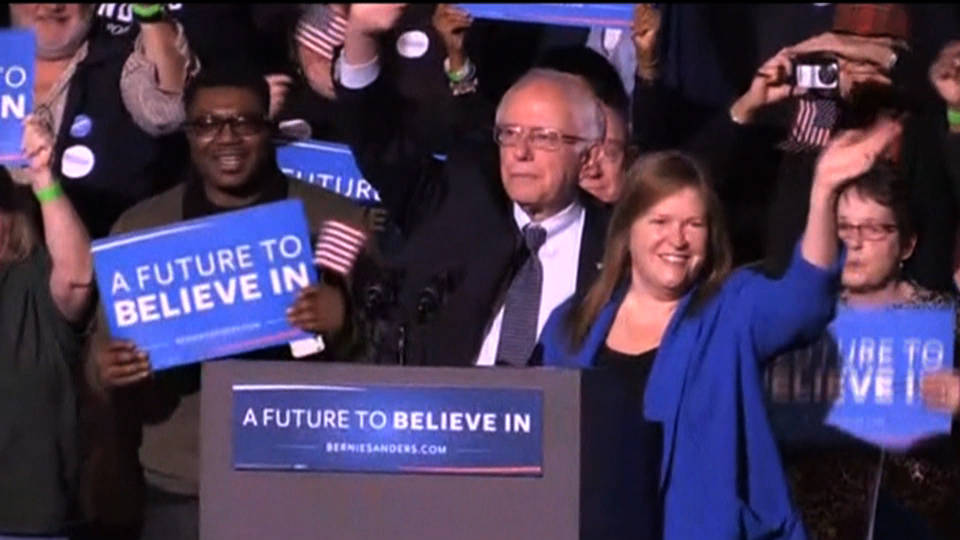
The final results from the Iowa Democratic caucus show Hillary Clinton beating Vermont Senator Bernie Sanders by just 0.2 percent, with 49.8 percent compared to 49.6 percent for Sanders. But Sanders swept the vote among young Democratic voters, with 84 percent of people between ages 17 and 29 choosing Sanders. The candidates are now looking ahead to next Tuesday’s primary in New Hampshire, where Sanders holds a double-digit lead in statewide polls.
Protesters Launch Global Actions Against TPP Signing in New Zealand
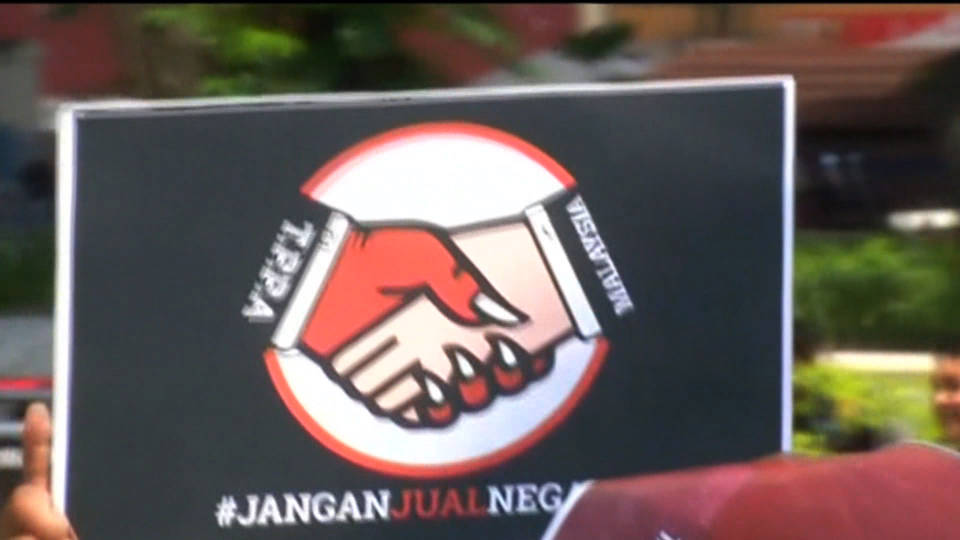
Activists around the world have kicked off a series of protests over the signing of the Trans-Pacific Partnership trade deal in New Zealand—due to take place just hours from this broadcast. The TPP encompasses 12 Pacific Rim nations, including the United States, and 40 percent of the world’s economy. Opponents say it will benefit corporations at the expense of health, the environment, free speech and labor rights. A Maori tribe refused a request to perform at a welcome ceremony for trade ministers, saying the TPP threatens sovereignty. Protesters are planning to nonviolently blockade the convention center in Auckland where the signing is due to take place.
Bangladesh: 6,000 Workers Narrowly Avoid Fire at Sweater Factory

In Bangladesh, a massive fire at a sweater factory has renewed concerns over labor conditions. The factory supplied Western retailers H&M and J.C. Penney. The blaze injured at least four people, but most of the factory’s more than 6,000 workers had not yet arrived to work. In 2013, a factory collapse in Bangladesh killed over 1,100 people.
Pakistan: 2 Workers Killed Protesting Privatization of Airline

In Pakistan, a crackdown by security forces on striking airline workers has killed at least two protesters at the airport in Karachi. The workers have been protesting plans to privatize the national airline.
U.S. Seeks to Quadruple Military Budget for Europe, Citing "Russian Aggression"

The Obama administration has proposed quadrupling its budget for European operations next year to address "Russian aggression." Obama reportedly plans to significantly ramp up deployment of heavy weapons to NATO countries in Central and Eastern Europe, even as Russian military activity in eastern Ukraine has calmed. Defense Secretary Ashton Carter also sought a 50 percent increase in spending on the U.S.-led fight against the self-proclaimed Islamic State.
Defense Secretary Ashton Carter: "While the basic elements of our resulting defense strategy remain valid, it’s also been abundantly clear to me over the last year that the world has not stood still since then—the emergence of ISIL and the resurgence of Russia being just a couple of the examples. This is reflective of a broader strategic transition underway, not unlike those we’ve seen in history following the end of other major wars."
Emergency Manager Who Switched Flint Water Resigns from Detroit Public Schools
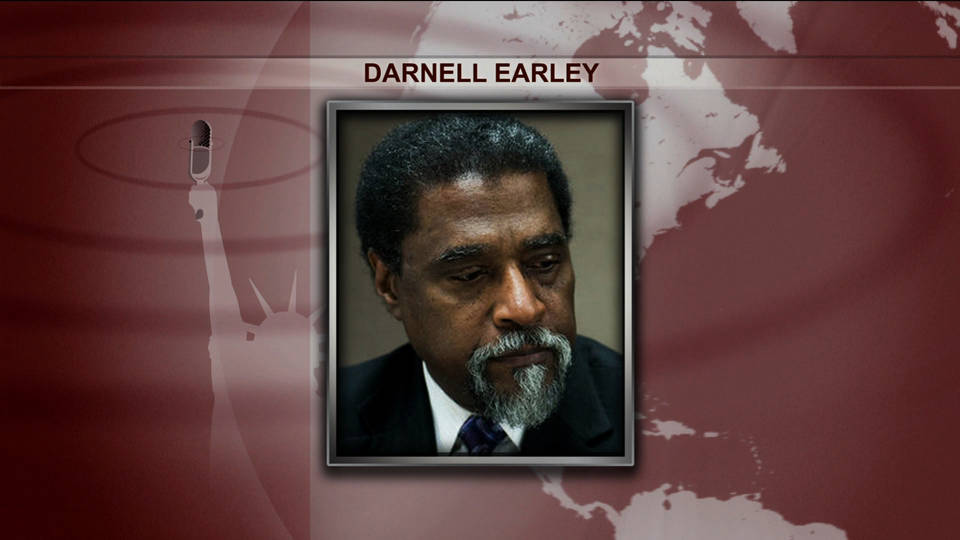
Congress is holding its first hearing today on lead poisoning in the water supply of Flint, Michigan. The crisis began after an unelected emergency manager appointed by Republican Governor Rick Snyder switched the source of Flint’s drinking water to the corrosive Flint River. Flint’s former emergency manager, Darnell Earley, refused to testify at today’s hearing despite a subpoena. On Tuesday, Earley announced he was resigning from his current position as emergency manager of the Detroit Public Schools. We’ll have more on the story after headlines.
Ramarley Graham's Family Holds Overnight Vigil to Mark 4 Years Since Police Killing

Here in New York, the family of Ramarley Graham has held an all-night vigil outside the local Justice Department office to mark four years since the unarmed African-American 18-year-old was fatally shot by police officer Richard Haste. On February 2, 2012, Haste shot Graham inside his home, in front of his grandmother and six-year-old brother. Haste was initially indicted for manslaughter by a grand jury, but the case was dismissed over a prosecutor’s error; a new grand jury declined to indict him. Since the shooting, Officer Haste has received nearly $25,000 in raises. Graham’s mother, Constance Malcolm, spoke to the local NBC station outside the Justice Department.
Constance Malcolm: "We really mean business. We want some answers. This office is the last place that could give us answers to why my son is dead."
Ramarley Graham’s family has called for the city to fire Officer Haste. The federal investigation is ongoing.
Saudi Arabia: Court Lifts Death Sentence, Imposes Lashes for Palestinian Poet

In Saudi Arabia, a court has overturned the death sentence against Palestinian poet Ashraf Fayadh, instead sentencing him to eight years in prison. Fayadh will also be subjected to 800 lashes, to be carried out over 16 occasions, and forced to renounce his poetry publicly. Fayadh had previously been convicted of apostasy and sentenced to beheading, sparking an international outcry among fellow artists.
Snowden Criticizes New "Privacy" Pact Between U.S. and EU

European officials have unveiled a deal with the United States to allow corporations including Google and Amazon to continue moving user data back and forth overseas. The so-called EU-U.S. Privacy Shield comes after the European Court of Justice struck down a prior agreement following revelations of U.S. mass surveillance fromNSA whistleblower Edward Snowden. The deal includes written U.S. assurances that intelligence agencies will not have indiscriminate access to European user data. Snowden was among those to criticize the new pact, tweeting: "It’s not a Privacy Shield, it’s an accountability shield."
Undocumented Mother of 3 Deported Despite Receiving Reprieve, Permission to Travel
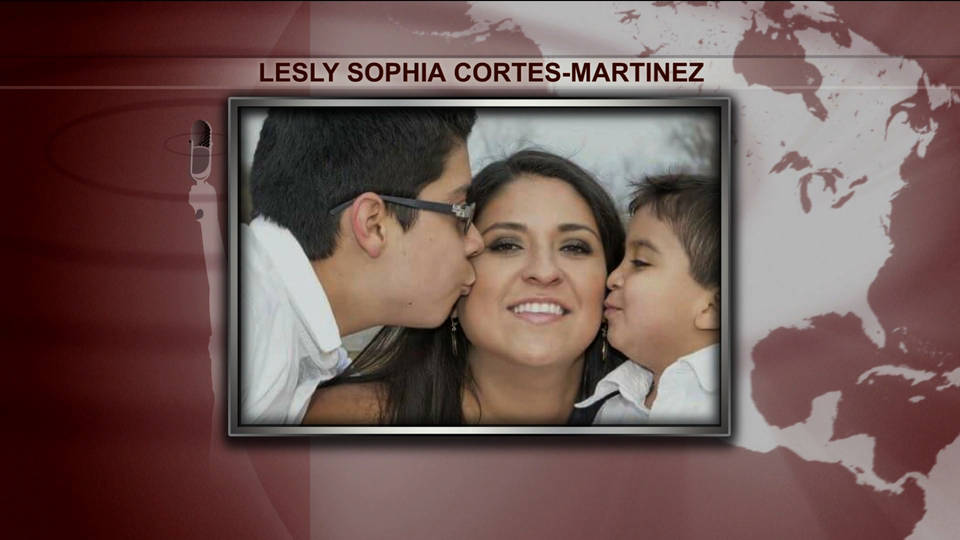
Immigrant rights advocates say an undocumented 32-year-old mother of three has been deported from the United States, even though she had been granted a reprieve from deportation under President Obama’s executive action. Lesly Sophia Cortez-Martinez came to the United States when she was 15. She was granted a reprieve from deportation under Obama’s Deferred Action for Childhood Arrivals Program, orDACA. Cortez-Martinez had reportedly received permission to visit Mexico. But border agents detained her when she returned to the Chicago airport, apparently citing an old deportation order from 2004. She was deported to Mexico Tuesday with her infant and another one of her children.
2 Journalists Slain over 2-Day Period in Mexico

Meanwhile, Reporters Without Borders has expressed concern about a new wave of violence against journalists in Mexico. In the southern state of Oaxaca, two journalists have been murdered over the span of two days, on January 21 and 22. Marcos Hernández Bautista, a reporter for Noticias newspaper who also worked for several radio stations, had reportedly expressed safety fears after reporting on the interests of bosses in the region. The second victim, Reinel Martínez Cerqueda, presented musical programs for a community radio station. Both journalists were shot to death.
Southern California Gas Company Faces Criminal Charges over Methane Leak
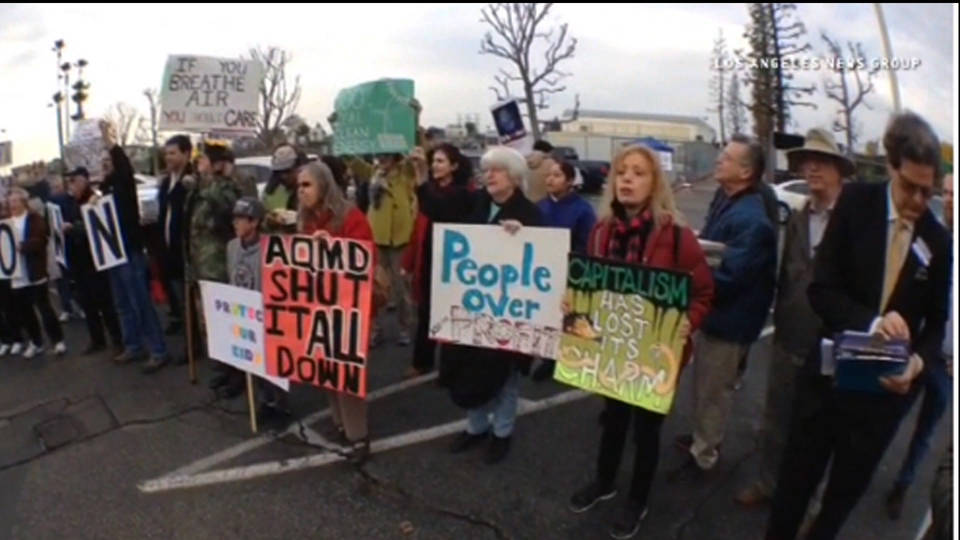
In California, Los Angeles prosecutors have filed criminal charges against the Southern California Gas Company over a massive ongoing methane gas leak. The company faces misdemeanor charges for failing to report the release of hazardous materials from the leak, which has been called the worst U.S. environmental disaster since the BP oil spill. California Attorney General Kamala Harris also sued the gas firm for violating health and safety laws. Thousands of people have been forced to evacuate as methane, a powerful greenhouse gas, continues to leak more than three months after the breach was revealed.
Autopsy Shows Former NFL Quarterback Among Dozens with Brain Disease CTE
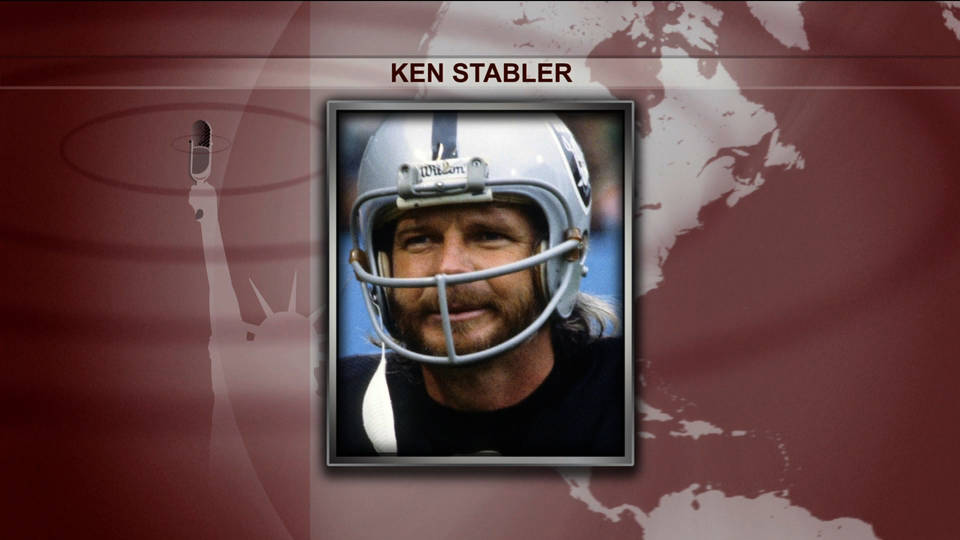
And new autopsy results show former NFL quarterback Ken Stabler had Stage 3 chronic traumatic encephalopathy, or CTE, the degenerative brain disease linked to repeated head trauma. Boston University researchers have found CTE in 90 of the 94 former NFL players they examined. Stabler had requested his brain be examined after he experienced cognitive decline before dying after a battle with colon cancer at the age of 69.
Donate today:
Follow:

TRAPping Access to Safe, Legal Abortions
WEB EXCLUSIVE

Pt 2: Michael Eric Dyson on The Black Presidency: Barack Obama and the Politics of Race in America
WEB EXCLUSIVE

Watch: Hillary Clinton Touts Progressive Record in Speech After Iowa Caucus---------------------207 West 25th Street, 11th Floor
New York, New York 10001, United States
---------------------
Democracy Now! Daily Digest: A Daily Independent Global News Hour with Amy Goodman & Juan González for Tuesday, February 2, 2016
democracynow.org
Stories:

Iowa Caucuses: Bernie Sanders Rallies to Tie Hillary Clinton; Ted Cruz Upsets Donald Trump

Clinton Laughs Off Question on Goldman Sachs, But Can Millions in Special Interest Cash Be Ignored?

After Dead Heat in Iowa, Will Clinton Move Further Left to Stop the Sanders Surge?

The Road to the White House Begins in Iowa, But Is It Already Sold to Wealthy Donors?
Spending by so-called "dark money" groups—political super PACs and other organizations who can hide their funders—is already far ahead of previous election cycles, with estimates it could reach up to half a billion dollars. Outside spending has surged since the Supreme Court’s 2010 Citizens United decision, which removed limits on campaign spending by ruling that donor money is a form of free speech. We are joined by The Intercept reporter Lee Fang, who’s been following the money trail, from the politicians at the podiums to the money in the shadows.
TRANSCRIPT
This is a rush transcript. Copy may not be in its final form.
AMY GOODMAN: The road to the White House might begin in Iowa, but in an era of unregulated campaign finance, that road may already have been sold to big donors. Spending by so-called dark money groups—political super PACs and other organizations who can hide their funders—is already far ahead of previous election cycles, with estimates it could reach up to half a billion dollars. Dark money groups have already spent more than $200 million on political ads alone since 2015. Just this weekend, the billionaire Koch brothers held a retreat for their wealthy allies in Palm Springs to discuss political spending and strategy. The Kochs’ political network plans to spend nearly $900 million in 2016, about as much as Democrats and Republicans will spend on their presidential nominees, but they are not a party.
We’re joined by a reporter who’s been following the money trail, from the politicians at the podiums to the money in the shadows. Lee Fang is an investigative journalist at The Intercept covering the intersection of money and politics. Lee Fang, joining us from San Francisco. Still with us, John Nichols, political writer for The Nation, and Ellen Chesler, senior fellow at the Roosevelt Institute, editor of the book Women and Girls Rising: Progress and Resistance Around the World.
Lee, talk about how money played a part in the Iowa caucus.
LEE FANG: Well, Amy, money played a big role. We’ve seen television, radio, direct mail just absolutely flooding the state, trying to convince voters to support certain candidates. You know, in the last two weeks, we saw establishment Republican effort to sink Donald Trump—Our Principles PAC. We don’t know the donors, but we know it’s being led by a number of consultants formerly associated with Mitt Romney, doing negative ads against Donald Trump. And it looks like they had a great effect last night, bringing Donald Trump from the number one spot for months to losing to Ted Cruz.
But I think one of the bigger stories of the election last night is that in spite of all the big money, the negative ads, you saw candidates who actually kind of flipped the table on the money and campaigned against it doing very well. Bernie Sanders was down by some 41 percent only four months ago and, as you mentioned earlier, fought this down to a draw, even though it looks like he was being outspent by the Hillary Clinton campaign. And he took time in his speech last night to really focus on the role of big money, calling out lobbyists, calling out the establishment. And even on the Republican side, Ted Cruz winning the election last night and hitting a lot of the same themes as Bernie Sanders in his victory speech, calling out the establishment Republicans, calling out lobbyists and saying that his campaign was being charged by small donors. I will note that that’s not true. Ted Cruz actually relied on big money donors, people giving as much as $10 million or $11 million to his super PAC. But I think it really speaks to the atmosphere, the political dynamics in Iowa today, that Ted Cruz took time to really claim that his campaign, like Bernie Sanders’, was being charged or being fueled by small donors. ... Read More →
Follow:
---------------------
Democracy Now! Daily Digest: A Daily Independent Global News Hour with Amy Goodman & Juan González for Tuesday, February 2, 2016
democracynow.org
Stories:

Iowa Caucuses: Bernie Sanders Rallies to Tie Hillary Clinton; Ted Cruz Upsets Donald Trump
The Iowa caucuses saw an upset victory for Republican Senator Ted Cruz over front-runner Donald Trump and a virtual tie between Hillary Clinton and rival Bernie Sanders. The latest returns show Clinton leading Sanders by less than half a percentage point, a result that would split Iowa’s delegate votes for the Democratic nomination. Some Democratic caucus sites decided their winner with a coin toss. In all six situations, Clinton won. Florida Senator Marco Rubio came in just behind Trump. On the Republican side, Cruz upset Donald Trump with the help of a strong evangelical turnout. We air highlights from the candidates’ Iowa speeches.
TRANSCRIPT
This is a rush transcript. Copy may not be in its final form.
AMY GOODMAN: The Iowa caucuses saw an upset victory for Republican Senator Ted Cruz over front-runner Donald Trump, while a virtual tie between Hillary Clinton and rival Bernie Sanders. The latest returns show Clinton leading Sanders by less than half a percentage point, a result that would split Iowa’s delegate votes for the Democratic nomination. Sanders was able to catch up with Clinton in Iowa despite polls showing him at least 40 points behind. Four in 10 caucusgoers voted for the first time, a segment that overwhelmingly favored Sanders. More than one in four Democratic voters listed income inequality as the election’s top issue. Some Democratic caucus sites decided their winner with a coin toss. In all six situations, Clinton won.
While Democrats waited anxiously for the results late into the night, the Republican contest was decided earlier. Texas Senator Ted Cruz upset national front-runner Donald Trump despite Trump’s dominance in the polls for months. Florida Senator Marco Rubio came in just behind Trump. Cruz won in a race that saw a record Republican turnout for Iowa and a strong showing of evangelical voters. Cruz also took Iowa despite opposing ethanol subsidies favorable to local corn growers, a stance that led Iowa Republican Governor Terry Branstad to openly oppose him.
On the Democratic side, [former] Maryland Governor Martin O’Malley announced he will suspend his campaign after attracting just 0.6 percent of the Iowa vote. O’Malley has floated a presidential run since 2013 but failed to gain traction with Democratic voters. For Republicans, former Arkansas Governor Mike Huckabee also announced he’s suspending his campaign.
We begin today’s show with highlights from Iowa. Vermont Senator Bernie Sanders finished the night in a virtual tie with Hillary Clinton, but sounded like a winner in his speech to supporters last night.
SEN. BERNIE SANDERS: Nine months ago, we came to this beautiful state. We had no political organization. We had no money. We had no name recognition. And we were taking on the most powerful political organization in the United States of America. And tonight, while the results are still not known, it looks like we are in a virtual tie.
And the reason that we have done so well here in Iowa, the reason I believe we’re going to do so well in New Hampshire and in the other states that follow, the reason is the American people are saying no to a rigged economy. They no longer want to see an economy in which the average American works longer hours for low wages, while almost all new income and wealth is going to the top 1 percent.
What the American people understand is this country was based and is based on fairness. On fairness. It is not fair when the top one-tenth of 1 percent today owns almost as much wealth as the bottom 90 percent. It is not fair when the 20 wealthiest people in this country own more wealth than the bottom half of America. So are you guys ready for a radical idea? Well, so is America. And that radical idea is: We are going to create an economy that works for working families, not just the billionaire class.
AMY GOODMAN: With a margin too close to call in the Democratic Iowa caucus, Hillary Clinton stopped short of claiming victory in her speech Monday night, though her campaign has issued a statement declaring she has won.
HILLARY CLINTON: To the families and friends across this state, I am deeply grateful.
AUDIENCE MEMBER: We love you!
HILLARY CLINTON: Well, I—I love all of you. But here’s what I want you to know. It is rare—it is rare that we have the opportunity we do now to have a real contest of ideas, to really think hard about what the Democratic Party stands for and what we want the future of our country to look like if we do our part to build it.
I am a progressive who get things done for people. I am honored to stand in the long line of American reformers who make up our minds that the status quo is not good enough, that standing still is not an option, and that brings people together to find ways forward that will improve the lives of Americans.
I look back over the years of my involvement, from that very first job I had at the Children’s Defense Fund, and I know—I know what we are capable of doing. I know we can create more good-paying jobs and raise incomes for hard-working Americans again. I know that we can finish the job of universal healthcare coverage for every single man, woman and child. I know—I know we can combat climate change and be the clean energy superpower of the 21st century. I know we can make our education system work for every one of our children, especially those who come with disadvantages. I know we can make college affordable and get student debt off the backs of young people. And I know we can protect our rights—women’s rights, gay rights, voting rights, immigrant rights, workers’ rights. I know, too, we can stand up to the gun lobby and get commonsense gun safety measures.
And how do we do that? We do that—we do that by securing the nomination, and then we do it by winning and going into that White House, as others before have, determined to push forward on the great goals and values that unite us as Americans.
AMY GOODMAN: In the Republican race, Texas Senator Ted Cruz pulled off an upset in the Iowa caucus, beating front-runner Donald Trump with 28 percent of the vote to Trump’s 24. Cruz called it a victory for conservatives.
SEN. TED CRUZ: Tonight is a victory for the grassroots. Tonight is a victory for courageous conservatives across Iowa and all across this great nation. Tonight, the state of Iowa has spoken. Iowa has sent notice that the Republican nominee and the next president of the United States will not be chosen by the media, will not be chosen by the Washington establishment, will not be chosen by the lobbyists, but will be chosen by the most incredible powerful force, where all sovereignty resides in our nation—by we, the people, the American people.
The last seven years of having a president, having an attorney general, that demonizes you, that vilifies you, that sides with the criminals and looters instead of the brave men and women of law enforcement, that will end on January 20th, 2017. So, tonight, the state of Iowa, the Democrats here seem to be in a virtual tie, between one candidate who admits he’s a socialist and the other candidate who pretends she’s not. I wish them both luck. But I will tell you this: As Margaret Thatcher observed, the problem with socialism is eventually you run out of other people’s money.
There is no force in Washington that can stand against the American people, that can stand against the grassroots, that can stand against our unity. We are going to do this together, as a movement from the people. And I tell you tonight, Iowa has made clear to America and the world, morning is coming. Morning is coming.
AMY GOODMAN: Donald Trump, who went into the Iowa caucus leading in the Republican polls, attempted to downplay his second-place finish.
DONALD TRUMP: I was told by everybody, "Do not go to Iowa. You could never finish even in the top 10." And I said, "But I have friends in Iowa. I know a lot of people in Iowa. I think they’ll really like me. Let’s give it a shot." They said, "Don’t do it." I said, "I have to do it." And we finished second.
And I want to tell you something: I’m just honored. I’m really honored. And I want to congratulate Ted, and I want to congratulate all of the incredible candidates, including Mike Huckabee, who’s become a really good friend of mine. So, congratulations to everybody. Congratulations.
And we’re leaving tonight. And tomorrow afternoon we’ll be in New Hampshire, and that will be something special. It’s going to be a great week, and we’re going to be up here next weekend. I think we’re going to be proclaiming victory, I hope.
I will say this: I don’t know who’s going to win between Bernie and Hillary. I don’t know what’s going to happen with Hillary, who’s got other problems, maybe bigger than the problems she’s got in terms of nominations.
We will go on to get the Republican nomination, and we will go on to easily beat Hillary or Bernie or whoever the hell they throw up there.
Iowa, we love you. We thank you. You’re special. We will be back many, many times. In fact, I think I might come here and buy a farm. I love it. OK? Thank you. Thank you, everybody. Thank you. Thank you very much.
AMY GOODMAN: That was Donald Trump. Mike Huckabee has suspended his campaign. Florida Senator Marco Rubio came in third in the Republican Iowa caucus with 23 percent of the vote, behind Ted Cruz and Donald Trump. The result was well ahead of expectations, giving Rubio a boost going into New Hampshire.
SEN. MARCO RUBIO: Tonight, here in Iowa, the people of this great state have sent a very clear message: After seven years of Barack Obama, we are not waiting any longer to take our country back. This is not a time for waiting. We are going to grow the conservative movement. We are going to take our message to the people, who are struggling paycheck to paycheck, to the students living under the burden of student loans, to the families struggling to raise their children with the right values. We will take our message to them, and we will bring them to our side. When I am our nominee, we will unite our party, we will grow our party, and we will defeat Hillary Clinton or Bernie Sanders or whoever they nominate.
AMY GOODMAN: Marco Rubio, coming in a close third in the Iowa caucus, as the candidates move on to New Hampshire. When we come back, a discussion about what took place in Iowa and then the money behind the candidates. Stay with us.
... Read More →
Clinton Laughs Off Question on Goldman Sachs, But Can Millions in Special Interest Cash Be Ignored?
Image Credit: The Intercept
The Intercept’s Lee Fang recently questioned Hillary Clinton about her speeches for Wall Street giant Goldman Sachs, which paid her $675,000 for just three appearances. After a town hall in Manchester, New Hampshire, Fang asked Clinton if she would release the transcripts of her paid speeches to Goldman Sachs. Clinton laughed and turned away. Fang joins us to discuss Clinton’s Wall Street ties along with Ellen Chesler, a senior fellow at the Roosevelt Institute and longtime Clinton supporter.
TRANSCRIPT
This is a rush transcript. Copy may not be in its final form.
AMY GOODMAN: Lee Fang, last month you attempted to speak with Hillary Clinton after she addressed a town hall in Manchester, New Hampshire. You asked her if she would release the transcripts of her paid speeches to Goldman Sachs. She laughed and turned away. I want to go to that clip.
LEE FANG: Hi, Secretary Clinton, will you release the transcripts of your paid speeches to Goldman Sachs?
HILLARY CLINTON: [laughs]
LEE FANG: No? There’s a lot of controversy over the speeches. Secretary, is that a no? Secretary Clinton, will you release the transcripts of your Goldman Sachs speeches?
AMY GOODMAN: So, Lee Fang, explain what happened and why you’re raising this issue of what she was paid to make a speech or speeches at Goldman Sachs.
LEE FANG: Well, Amy, since 2001, Bill and Hillary Clinton have earned over $115 million on the speaker circuit, going out to private corporations, foundations, special interest groups, and charging as much as $200,000, $300,000 per speech. I mean, this is really unprecedented in American history that you have a leading candidate of a major party enriching themselves personally from special interest groups that have been lobbying them and will be lobbying them if they do win the White House. So there’s been a lot of talk about, you know, what these speeches actually entailed.
And Hillary Clinton has defended herself, saying that she’s basically giving a boilerplate speech, she wants to have more education and more conversations, and this is healthy for our democracy. On the other hand, there have been reports that when Hillary Clinton has gone to some special interest groups—for example, she gave three speeches to Goldman Sachs, making over $600,000 from that one investment bank—that she gave a very specially tailored message, saying that she’s against all of this anti-bank populism. According to Politico, she reassured the bankers that she wouldn’t be taking the line of Elizabeth Warren or Obama really criticizing the big banks. And so, this is a big issue, because, again, this—
AMY GOODMAN: I want to get Ellen Chesler, a Hillary Clinton supporter, to respond.
ELLEN CHESLER: In all due respect, I mean, I actually was at one of those Goldman Sachs speeches, and it was about foreign policy, completely about foreign policy. And the entire fee for the speaking went to support the Clinton Foundation. And this raises a big question, in my view. I mean, I think America needs to do a little bit better by its ex-presidents, because we’ve put them in a situation—and President Obama is going to be in the same situation—where in order to support—unless they’re individually wealthy themselves, which is very rare—in order to support their lives after being in office—I mean, these offices no longer allow you to kind of fade away to the Supreme Court or—as has been in the past, or to a college president—
AMY GOODMAN: But you said the money goes to the foundation, not to them.
ELLEN CHESLER: So the money supported the foundation, almost all of it. I don’t know exactly the numbers, because I’m not inside to that.
AMY GOODMAN: Well, Lee Fang, what about that?
ELLEN CHESLER: So that, I mean, you know, again, it just seems to me—
AMY GOODMAN: Well, let me ask—we only have 30 seconds—Lee Fang, your response to that?
LEE FANG: I believe the Clintons have said some of the money has gone to the foundation—
ELLEN CHESLER: Most of it.
LEE FANG: —but the vast majority of it has personally enriched them. They’ve released their personal ethics disclosures, and it’s clear that the Clintons have made a lot of money, tens of millions of dollars, as I mentioned, earning over $115 million from the speaker circuit over the last 16 years.
ELLEN CHESLER: And then they’ve given it to the foundation.
LEE FANG: This is truly unprecedented.
ELLEN CHESLER: Then they’ve given it to the foundation.
AMY GOODMAN: Well, we’re going to have to leave it there, but we’ll continue to explore this, of course. Lee Fang with The Intercept, Ellen Chesler with the Roosevelt Institute, and thanks also to John Nichols from The Nation. This is Democracy Now! We will be covering New Hampshire.
... Read More →
After Dead Heat in Iowa, Will Clinton Move Further Left to Stop the Sanders Surge?
With Iowa out of the way, the presidential contest now shifts to New Hampshire, which holds its primary a week from today. Then come contests in Nevada and South Carolina, followed by the delegate-rich "Super Tuesday" primaries on March 1. Although Bernie Sanders was able to tie Clinton in Iowa and leads her in the New Hampshire polls, he’ll face a tougher challenge as the contest moves to the Southern states. And Clinton already has a big advantage away from the voting booths: the support of several hundred "superdelegates," who vote based on their own preferences, not their party’s state results. We discuss the Iowa results and look ahead to what’s next with two guests: Ellen Chesler, a longtime supporter of Hillary Clinton and senior fellow at the Roosevelt Institute, and John Nichols, political writer for The Nation, which has endorsed Bernie Sanders, and author of several books, including the newly updated "The 'S' Word: A Short History of an American Tradition...Socialism."
TRANSCRIPT
This is a rush transcript. Copy may not be in its final form.
AMY GOODMAN: With Iowa out of the way, the presidential contest now shifts to New Hampshire, which holds its primary a week from today. After New Hampshire comes contests in Nevada and South Carolina, followed by the delegate-rich Super Tuesday primaries on March 1st. Despite a turnout of only a few hundred thousand voters and being one of the whitest states in the country—the fifth-whitest, to be exact—Iowa plays an outsize role as the first contest in a lengthy campaign that now begins two years before the eventual winner’s inauguration. Although Bernie Sanders was able to tie Clinton in Iowa and leads her in the New Hampshire polls, he’ll face a tougher challenge as the contest moves to the Southern states. And Clinton already has a big advantage away from the voting booths: the support of several hundred superdelegates who vote based on their own preferences, not their party’s state results.
To discuss the Iowa results and look ahead to what’s next, we’re joined by two guests. Here in New York, Ellen Chesler is with us. She is a longtime supporter of Hillary Clinton, a senior fellow at the Roosevelt Institute. And in Des Moines, Iowa, John Nichols is a political writer for The Nation, which has endorsed Bernie Sanders. An updated version of his book, The "S" Word: A Short History of an American Tradition...Socialism, has just been published. His other books include Dollarocracy: How the Money and Media Election Complex Is Destroying America.
We welcome you both to Democracy Now! But, John, you are in Iowa right now. Describe what took place, on both sides of the aisle.
JOHN NICHOLS: Well, I don’t know if you’ve got a couple hours, but a lot took place. It was really quite a remarkable night. And the important thing to begin with is the kind of disarray of the Republican race. It’s fascinating what happened there. As of Monday morning, virtually everyone was talking about the likelihood of a Donald Trump win. Now we end up with not only Donald Trump not winning, but him, Trump, almost falling into third place. The Cruz win is a big deal. It has established him as the leading purer conservative, for lack of a better term, the guy who will go hard to the right and likely attract the support not just of Mike Huckabee and Rick Santorum, but ultimately, depending on how this race goes forward, someone like a Ben Carson.
But the interesting thing about what happened on the Republican side is that you didn’t get rid of all the kind of mid-ticket candidates. If the results hold—and there’s still some sorting out to do, but if the results holds as expected, Ted Cruz will win delegates; Donald Trump will win delegates; Marco Rubio, who ran far better than expected, will win delegates; Ben Carson will win delegates; and Rand Paul and Jeb Bush will win at least one delegate each. So, I mean, it’s a very, very kind of ripped-up field. I think a lot of people are going to go into New Hampshire. I think a nasty, nasty race—and it was ugly, very expensive and negative ads to the last minutes—will go on in New Hampshire, and perhaps a good deal beyond.
On the Democratic side, you had something that was very different: you know, a smaller field, to begin with, and a pretty clear race between Hillary Clinton and Bernie Sanders, with Martin O’Malley really running a noble effort, touring the state, working hard, but never quite getting traction. O’Malley has now dropped out.
But as you got to that final result, I can just tell you that I was in precincts last night, and it was a remarkable thing to watch. You had traffic jams, lines pouring out of those precincts, and people of, you know, kind of every background showing up. Now, I was in Des Moines, the most diverse city in Iowa, and—or at least one of the most diverse, and so I did see a real mix of people. I went to a precinct in an African-American neighborhood, and I saw immigrants, longtime residents, as well as students from nearby college. There were long lines, but people really were getting along with each other. I saw Hillary Clinton people helping Bernie Sanders people fill out their registration forms. And so, the caucuses themselves were long and functional.
The result, however, was wild. And I was in the headquarters of these candidates last night. It was a fascinating thing to watch, because you just don’t have this very often in politics, where, you know, as the night goes on, you have a clear front-runner—and Hillary Clinton was the clear front-runner early in the evening. She had a four- or five-point lead. It looked like it would hold to what the polls had suggested. But as the night went on, it got closer and closer and closer, ’til you ended up with this razor-thin result, which might go, you know, by a tiny bit to Hillary Clinton, but I think I would suggest The Des Moines Register headline, "Dead Heat," is a pretty fair one.
And what’s significant about that, how it worked—and this will be the last bit of report I’ll give you, at least on the caucuses themselves—is that the caucuses are complex. You can vote and revote. If things are uncertain, you can reshuffle who’s in them. And in some of these caucuses, that were literally packed with people, especially new people—a lot of students, a lot of low-income folks, working-class folks, a surprising number, at least in some of these places, immigrants, who were participating for the first time, 17-, 18-year-olds from high schools who are participating because they’ll be old enough to vote in November and thus, under the Iowa rules, are allowed to be a part of it—all of these people, you know, just took time to make this all work. And you came down to this very close result. One of the reasons why Sanders closed the margin at the end, why it got closer and closer through the night, is that it was the precincts that had this incredibly boosted turnout of new voters that took the longest to count, because you often had a lot of forms to fill out, a lot of details to go through.
But at the end of the night, you ended up with a situation where—fairly, I think—both Hillary Clinton and Bernie Sanders could claim a victory—at least a victory of sorts. And it’s important to note Hillary Clinton is the first woman to win the Iowa caucuses. This is a—this is a major breakthrough for a state that has not seen women get elected to some high offices even to this point. And then also it’s important to note that on the Republican side you had children of immigrants—Ted Cruz and Marco Rubio—running first and third, almost knocking out a billionaire, in the second place. So, pretty interesting results across the board.
AMY GOODMAN: So there are a lot of interesting numbers. I think the Republican figures are 182,000 Republican caucusgoers turned out, breaking the record of 122,000 in 2012. I mean, by my calculation, that’s 50 percent more people came out and voted in the Republican. And those votes are counted individually. We watched them, you know, counting their paper ballots.
JOHN NICHOLS: Yeah.
AMY GOODMAN: Now, the Democrats are different. They don’t count paper ballots. They caucus, and they choose delegates. Now, when you talk about this being extremely close, a virtual tie, can you explain, John, in six of these caucuses, they actually flipped a coin? And in every one of those—
JOHN NICHOLS: Yeah.
AMY GOODMAN: —Hillary Clinton won? I mean, luck be a lady tonight.
JOHN NICHOLS: Well, in fairness, at the caucuses I’ve seen—and I’ve been a caucuses going back for a quarter-century—what happens is, you let one campaign call it, right? And they call. And in these different caucuses, some places the Clinton person called, some places the Sanders person called. And then, you know what? If they get it, they get it.
You know, the problem of doing it any other way, Amy, is that they don’t do that right away. When you get to the coin toss, you have allowed the campaigns to make their pitches, to talk to one another. This is not like voting. It’s not like some secret process in the classic sense. Candidates—or, campaigners walk across the room. If you’re a Hillary Clinton backer, you go to a Bernie Sanders backer. You say, "Hey, you know, really, don’t you want to come over and be with us? I know you"—because these are in neighborhoods. They all go to the O’Malley backers and try to get them to come across. They then count who they’ve got. And maybe, you know, the Clinton people have got 41, the Sanders people have got 41. They say, "Hey, does anybody want to change?" They allow for more debate. That’s why some of these caucuses took a couple hours. And at the end of the day, if they cannot get people to break from their commitments, they flip the coin. It is an imperfect system, but frankly, people generally walk away accepting it.
The one final element I will throw into this, Amy, is that in these caucuses, these people really do know one another. They are friends and neighbors. And interestingly enough, by and large, they’re people who work together on campaigns in the fall. And so, I think, from the outside, a lot of people might expect a great deal of bitterness—and sometimes there can be that—but when I’ve been on the ground in these caucuses, and certainly last night, I saw people, you know, arguing issues really passionately, arguing electability really passionately, but, generally, accepting the results.
AMY GOODMAN: I want to bring in Ellen Chesler to this discussion. Ellen, you’ve been a longtime Hillary Clinton supporter, just had a party for her. You’ve had parties for her at your house, supporting her, fundraisers.
ELLEN CHESLER: Years ago, not this cycle, but—
AMY GOODMAN: Ah. Talk about this razor-close finish—the campaign has declared victory, but clearly this is a virtual tie—and what it means.
ELLEN CHESLER: I think it means that Hillary Clinton actually did quite well in Iowa, a state and in a process that rewards insurgency. You had a situation where she came in as the front-runner, the, quote-unquote, "establishment candidate"—although let’s remember that Bernie Sanders has been in government for 25 years, as long as she has, and that kind of makes him part of the establishment, too, as he defines it. But he clearly was the unknown. He’s never passed a bill, doesn’t have the kind of record. She’s the international figure of renown and the one who’s been attacked for 25 years, too—let’s remember that. I mean, this is a woman who has been the subject of the attack machine on the right—and to some extent, from the left—for a quarter of a century. And she more than held her own.
And she held her own—and I put an emphasis on much of what John said—in a situation where the real divide—and this is what’s fascinating to me; I’m Hillary Clinton’s age, so I’ve been around a long time—the real divide is a generational divide here. He did well because he brought in a whole lot of new voters. The Times reported 171,000 caucusgoers on the Democratic side. They don’t cast ballots, so you don’t know exactly if that number is true, but in that ballpark. He brought in a lot of new people under, you know, the age of 25. And that’s a great thing for our democracy, and as somebody, you know, who’s at the end of my political career and started when I was that age myself in the 1960s, I really see the value of that, and I know the Clinton campaign does, as well. And they voted, you know, nine to one, and similarly—for Bernie, and similarly, people of my age and even, you know, 45 to 65, voted eight to one for her. And that divide was even greater than the gender divide or the class divide or whatever other divides.
And I think that’s a really interesting and cautionary tale—I mean, certainly for the Clinton campaign, which now needs to move forward and try to win over some of those supporters. And I think the positive tone of the campaign is really all about that. It’s all about not antagonizing anybody. I mean, after all, we’re choosing between two progressive candidates here. One may be more progressive, more clearly defined between the haves and have-nots, between Wall Street and Main Street—in his definition of it. But if you actually look at her platform, as The Nation itself said in Michelle Goldberg’s cover story, in which I was quoted a couple of months ago—is it already?—this is the most progressive platform a Democrat has run since, you know, Lyndon Johnson.
AMY GOODMAN: In fact, Hillary Clinton called herself a progressive last night when she spoke. John Nichols, do you think Bernie Sanders has had a major effect on Hillary Clinton’s platform?
JOHN NICHOLS: There’s simply no question of that. And that’s why you have primaries. I really share a lot of Ellen’s views here. And I think that, you know, the one thing I would bring up very strongly is that there was a generational divide. And it’s clear that these young folks were coming to vote for Bernie Sanders. I would be—I warn a lot of the national pundits that they weren’t necessarily coming to vote against Hillary Clinton.
Sanders made a remarkable connection with folks in Iowa, and it was rooted in a tremendous level of actual campaigning, something like 150 stops across the state. And part of that connection is an interesting one, which I don’t think we begin to cover well at the national level. You’ve got to get pretty down to the grassroots to hear this. But when I talked to these young folks who were coming, and also to just generally a lot of the folks who were backing Sanders, they were backing him not merely because of what has happened. It wasn’t merely because of the economic downturn or the history of recent years, many of the economic concerns that we know about. There was also a great deal of concern about the future. And again, this went up, you know, not—above many of the young folks. And it was a concern that in an age of automation, in an age of radical transformation of our workplaces and our work life, that it was going to be pretty hard to have a future that will be as defined, or maybe even as prosperous, as their parents or grandparents. And so, what I heard from an awful lot of folks was that they wanted someone in presidency, in a position of power—they wanted someone at least at the lead in our politics—who was going to watch out for them, who was going to make sure that the decisions made in those moments would be on behalf of the new immigrant, of the person working a $10-an-hour job or the single mom, of a whole bunch of folks who have been really badly harmed by our economic system. And what I heard was Sanders hitting that very, very early on, really connecting with a lot of that.
But I also heard Hillary Clinton taking in a lot of these messages. And she’s—remember, she’s worked on some of this stuff for decades, but also beginning to hear and connect with a lot of this, as well. I think that the Iowa race has had a real impact on Hillary Clinton. I think her final speeches in Iowa were very populist, very economically focused. And my sense is that she did well, not merely because of her past, but because
she, too, was listening and connecting and hearing. And as this race goes on, I would love it if one of these additional Democratic debates—and there will be additional Democratic debates—I would love it if one of them was just about the future, not about the past, because, I can tell you, in Iowa, that’s what an awful lot of these, especially the young, voters were voting on.
AMY GOODMAN: Ellen Chesler?
ELLEN CHESLER: Well, I—again, John and I are in agreement on a lot of things. In addition to the generational divide, if you looked at the analysis this morning, those who were more practically focused, who are policy wonkish, are the Clinton supporters. And young people, who are idealists and who want a very sort of starry-eyed definition of the future, tended toward Sanders. And I think what’s going to happen now is a much more deeper dive into how Sanders believes he can realize his promises for the future. And that’s going to play to Hillary’s advantage, because she’s the one who’s actually been there working things out.
AMY GOODMAN: Well, that’s clearly what she’s saying. She’s saying, "Well, it may all look nice on paper, but how do you achieve it?" But, John Nichols, this question of whether she is a progressive, having voted for the war in Iraq, was on the board of Wal-Mart for years, and most recently going after Bernie Sanders, saying he would take down Obamacare, when Bernie Sanders was saying he wanted single payer. Last night, she started talking about universal healthcare, so I think he’s having an effect there.
JOHN NICHOLS: Mm-hmm, mm-hmm.
ELLEN CHESLER: Yeah.
AMY GOODMAN: But talk about that label "progressive" and what exactly it means.
JOHN NICHOLS: Well, I mean, again, how many hours do you have? Because the label "progressive" has been polled in an awful lot of ways. I’m from rural Wisconsin, and so I grew up with an understanding of progressivism as something that was to the left of liberal. It was a point of view that really did emphasize a lot of economic justice, that tended to be very antiwar or skeptical of wars. That’s the Robert M. La Follette progressivism. And frankly, I think that’s a place where Bernie Sanders would put himself, at least, historically, as well as with a little bit of the New Deal FDR vision.
ELLEN CHESLER: But again, John, where’s the meat?
JOHN NICHOLS: And so, I—yeah. What? Well, this is—that’s a great old question. And I am not—you know, I’m not going to begin to suggest to you that I know exactly where this campaign will go, but I would caution—I would caution on suggesting that Bernie Sanders will necessarily present himself as starry-eyed. I think that Ellen is right. In these next weeks, Bernie Sanders is going to have to lay out specifics. He’s going to talk about budget issues, and he’s going to talk about agenda and ideas. But at the core of what he’s talking about—and we talked about this in The Nation editorial, or the editors did—is this concept that, you know, you really do have to change our politics a lot. It’s not just changing our governing. It’s getting a very different politics that brings a lot of new people in. I think that’s been Sanders’s point.
I think that Hillary Clinton is also recognizing that. And so, my sense is that this campaign has already changed a great deal. I think it’s moved immensely from where it began. And my sense is that the debates that come, which will be one-on-one debates because you’ve lost Martin O’Malley—which is too bad, because he was actually a very wise contributor—but these debates that come, I think, are going to go deep into those economic issues, they’ll also focus a good deal on foreign policy, but as they do, I don’t think it’s going to be starry-eyed idealism versus, you know, hardtacks veteran experience. I think you’re going to see two people who have some different views. And I hope that moderators of these debates, and people that tweak it out and cover it, will encourage them to explore those differences, you know, not with bitterness or anger, but with a really deep debate about where the Democratic Party ought to go in the next decades.
AMY GOODMAN: We’re going to break for a minute.
JOHN NICHOLS: And that’s an open question. Yeah.
AMY GOODMAN: And we’re going to bring Lee Fang into this conversation. We’re talking to John Nichols, political writer for The Nation, which has endorsed Bernie Sanders. Ellen Chesler is with us, a longtime supporter of Hillary Clinton, senior fellow at the Roosevelt Institute. Stay with us.... Read More →
she, too, was listening and connecting and hearing. And as this race goes on, I would love it if one of these additional Democratic debates—and there will be additional Democratic debates—I would love it if one of them was just about the future, not about the past, because, I can tell you, in Iowa, that’s what an awful lot of these, especially the young, voters were voting on.
AMY GOODMAN: Ellen Chesler?
ELLEN CHESLER: Well, I—again, John and I are in agreement on a lot of things. In addition to the generational divide, if you looked at the analysis this morning, those who were more practically focused, who are policy wonkish, are the Clinton supporters. And young people, who are idealists and who want a very sort of starry-eyed definition of the future, tended toward Sanders. And I think what’s going to happen now is a much more deeper dive into how Sanders believes he can realize his promises for the future. And that’s going to play to Hillary’s advantage, because she’s the one who’s actually been there working things out.
AMY GOODMAN: Well, that’s clearly what she’s saying. She’s saying, "Well, it may all look nice on paper, but how do you achieve it?" But, John Nichols, this question of whether she is a progressive, having voted for the war in Iraq, was on the board of Wal-Mart for years, and most recently going after Bernie Sanders, saying he would take down Obamacare, when Bernie Sanders was saying he wanted single payer. Last night, she started talking about universal healthcare, so I think he’s having an effect there.
JOHN NICHOLS: Mm-hmm, mm-hmm.
ELLEN CHESLER: Yeah.
AMY GOODMAN: But talk about that label "progressive" and what exactly it means.
JOHN NICHOLS: Well, I mean, again, how many hours do you have? Because the label "progressive" has been polled in an awful lot of ways. I’m from rural Wisconsin, and so I grew up with an understanding of progressivism as something that was to the left of liberal. It was a point of view that really did emphasize a lot of economic justice, that tended to be very antiwar or skeptical of wars. That’s the Robert M. La Follette progressivism. And frankly, I think that’s a place where Bernie Sanders would put himself, at least, historically, as well as with a little bit of the New Deal FDR vision.
ELLEN CHESLER: But again, John, where’s the meat?
JOHN NICHOLS: And so, I—yeah. What? Well, this is—that’s a great old question. And I am not—you know, I’m not going to begin to suggest to you that I know exactly where this campaign will go, but I would caution—I would caution on suggesting that Bernie Sanders will necessarily present himself as starry-eyed. I think that Ellen is right. In these next weeks, Bernie Sanders is going to have to lay out specifics. He’s going to talk about budget issues, and he’s going to talk about agenda and ideas. But at the core of what he’s talking about—and we talked about this in The Nation editorial, or the editors did—is this concept that, you know, you really do have to change our politics a lot. It’s not just changing our governing. It’s getting a very different politics that brings a lot of new people in. I think that’s been Sanders’s point.
I think that Hillary Clinton is also recognizing that. And so, my sense is that this campaign has already changed a great deal. I think it’s moved immensely from where it began. And my sense is that the debates that come, which will be one-on-one debates because you’ve lost Martin O’Malley—which is too bad, because he was actually a very wise contributor—but these debates that come, I think, are going to go deep into those economic issues, they’ll also focus a good deal on foreign policy, but as they do, I don’t think it’s going to be starry-eyed idealism versus, you know, hardtacks veteran experience. I think you’re going to see two people who have some different views. And I hope that moderators of these debates, and people that tweak it out and cover it, will encourage them to explore those differences, you know, not with bitterness or anger, but with a really deep debate about where the Democratic Party ought to go in the next decades.
AMY GOODMAN: We’re going to break for a minute.
JOHN NICHOLS: And that’s an open question. Yeah.
AMY GOODMAN: And we’re going to bring Lee Fang into this conversation. We’re talking to John Nichols, political writer for The Nation, which has endorsed Bernie Sanders. Ellen Chesler is with us, a longtime supporter of Hillary Clinton, senior fellow at the Roosevelt Institute. Stay with us.... Read More →

The Road to the White House Begins in Iowa, But Is It Already Sold to Wealthy Donors?
Spending by so-called "dark money" groups—political super PACs and other organizations who can hide their funders—is already far ahead of previous election cycles, with estimates it could reach up to half a billion dollars. Outside spending has surged since the Supreme Court’s 2010 Citizens United decision, which removed limits on campaign spending by ruling that donor money is a form of free speech. We are joined by The Intercept reporter Lee Fang, who’s been following the money trail, from the politicians at the podiums to the money in the shadows.
TRANSCRIPT
This is a rush transcript. Copy may not be in its final form.
AMY GOODMAN: The road to the White House might begin in Iowa, but in an era of unregulated campaign finance, that road may already have been sold to big donors. Spending by so-called dark money groups—political super PACs and other organizations who can hide their funders—is already far ahead of previous election cycles, with estimates it could reach up to half a billion dollars. Dark money groups have already spent more than $200 million on political ads alone since 2015. Just this weekend, the billionaire Koch brothers held a retreat for their wealthy allies in Palm Springs to discuss political spending and strategy. The Kochs’ political network plans to spend nearly $900 million in 2016, about as much as Democrats and Republicans will spend on their presidential nominees, but they are not a party.
We’re joined by a reporter who’s been following the money trail, from the politicians at the podiums to the money in the shadows. Lee Fang is an investigative journalist at The Intercept covering the intersection of money and politics. Lee Fang, joining us from San Francisco. Still with us, John Nichols, political writer for The Nation, and Ellen Chesler, senior fellow at the Roosevelt Institute, editor of the book Women and Girls Rising: Progress and Resistance Around the World.
Lee, talk about how money played a part in the Iowa caucus.
LEE FANG: Well, Amy, money played a big role. We’ve seen television, radio, direct mail just absolutely flooding the state, trying to convince voters to support certain candidates. You know, in the last two weeks, we saw establishment Republican effort to sink Donald Trump—Our Principles PAC. We don’t know the donors, but we know it’s being led by a number of consultants formerly associated with Mitt Romney, doing negative ads against Donald Trump. And it looks like they had a great effect last night, bringing Donald Trump from the number one spot for months to losing to Ted Cruz.
But I think one of the bigger stories of the election last night is that in spite of all the big money, the negative ads, you saw candidates who actually kind of flipped the table on the money and campaigned against it doing very well. Bernie Sanders was down by some 41 percent only four months ago and, as you mentioned earlier, fought this down to a draw, even though it looks like he was being outspent by the Hillary Clinton campaign. And he took time in his speech last night to really focus on the role of big money, calling out lobbyists, calling out the establishment. And even on the Republican side, Ted Cruz winning the election last night and hitting a lot of the same themes as Bernie Sanders in his victory speech, calling out the establishment Republicans, calling out lobbyists and saying that his campaign was being charged by small donors. I will note that that’s not true. Ted Cruz actually relied on big money donors, people giving as much as $10 million or $11 million to his super PAC. But I think it really speaks to the atmosphere, the political dynamics in Iowa today, that Ted Cruz took time to really claim that his campaign, like Bernie Sanders’, was being charged or being fueled by small donors. ... Read More →
Headlines:
Iowa Caucuses: Cruz Beats Trump; Sanders and Clinton in Tie
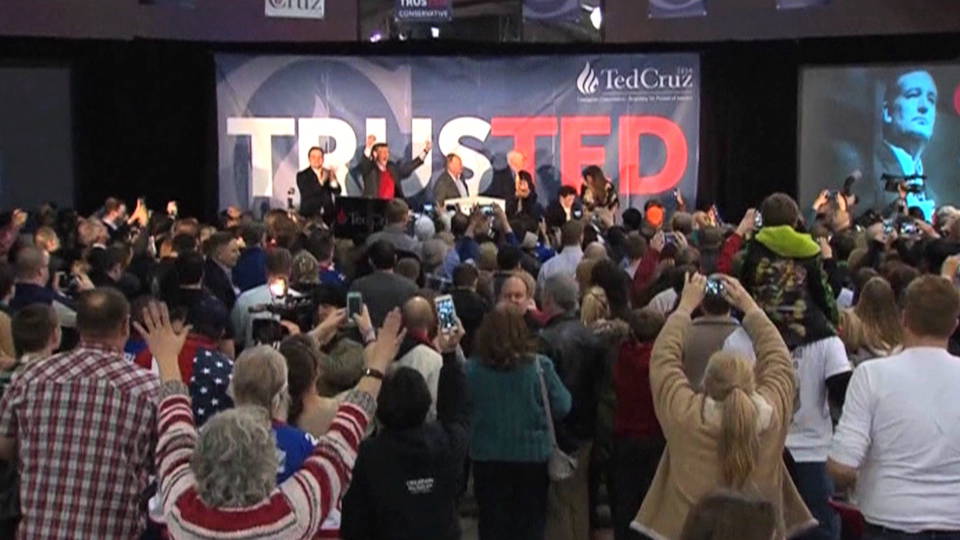
The Iowa caucuses saw an upset victory for Republican Senator Ted Cruz over front-runner Donald Trump and a virtual tie between Hillary Clinton and rival Bernie Sanders. The latest returns show Clinton leading Sanders by less than half a percentage point, a result that would split Iowa’s delegate votes for the Democratic nomination. Addressing supporters, Sanders said Iowa has begun a "political revolution."
Sen. Bernie Sanders: "I think the people of Iowa have sent a very profound message to the political establishment, to the economic establishment and, by the way, to the media establishment. The powers that be—Wall Street with their endless supply of money, corporate America, the large campaign donors—are so powerful that no president can do what has to be done alone. And that is why—and that is why what Iowa has begun tonight is a political revolution."
Sanders was able to catch up with Clinton in Iowa despite polls once showing him 40 points behind. On the Republican side, Ted Cruz upset Donald Trump with the help of a strong evangelical turnout. Cruz called his win a "victory for the grassroots."
Sen. Ted Cruz: "Tonight is a victory for the grassroots. Tonight is a victory for courageous conservatives across Iowa and all across this great nation. Tonight, the state of Iowa has spoken."
We’ll have more from Iowa after headlines.
World Health Org. Declares Zika an International Public Health Crisis

The World Health Organization has declared the Zika virus an international public health emergency. While the virus itself is usually not life-threatening, it appears to be linked to microcephaly, which causes babies to be born with abnormally small heads. Microcephaly also causes a host of other health problems, including seizures, developmental delays, hearing loss and vision problems. The WHO says the Zika virus is "spreading explosively" and that up to 4 million people in the Americas could be infected by the end of this year. World Health Organization Director-General Dr. Margaret Chan spoke out at a news conference in Geneva.
Dr. Margaret Chan: "I am now declaring that the recent cluster of microcephaly and other neurological abnormalities reported in Latin America, following a similar cluster of French Polynesia in 2014, constitutes a public health emergency of international concern."
Scientists have linked rising temperatures from global warming to the increased incidence of mosquito-borne infections such as Zika.
Saudi Arabia Admits to October Airstrike on MSF Hospital
A Saudi military spokesman has acknowledged Saudi Arabia bombed a Doctors Without Borders hospital in Yemen in October. Saudi Arabia had previously denied the October 27 airstrike, which injured one person and completely destroyed the small hospital in Saada province, leaving an estimated 200,000 people without access to a medical facility. The U.S.-backed, Saudi-led coalition has been accused of carrying out multiple attacks on health facilities in Yemen in recent months. In January, an airstrike destroyed another hospital supported by Doctors Without Borders, killing at least six patients and staff. Doctors Without Borders Executive Director Jason Cone has accused Saudi Arabia of waging the ongoing war in Yemen with "utter disregard for international humanitarian law."
Afghanistan: Taliban Attack in Kabul Kills 20 Police Officers
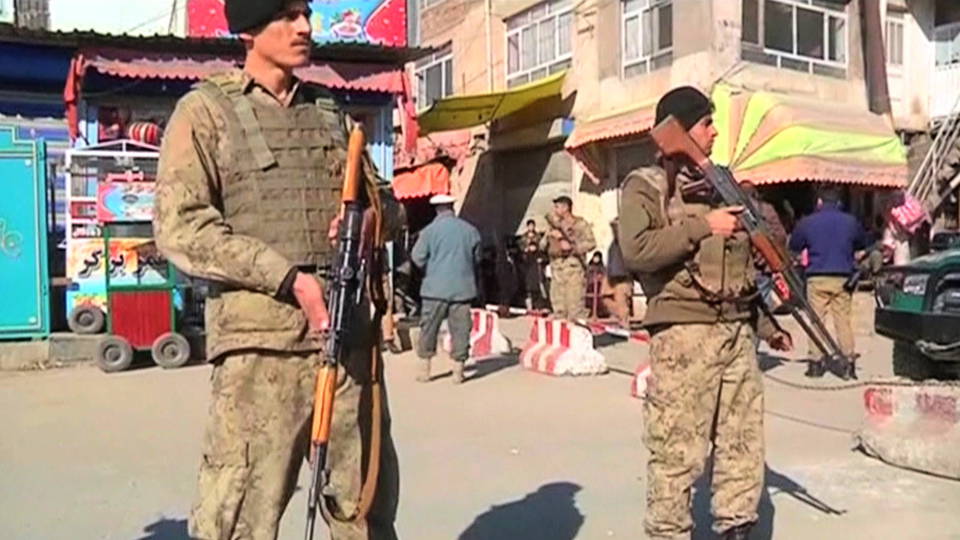
In Afghanistan, a Taliban suicide attack near a police complex in Kabul has killed at least 20 police officers and wounded dozens more. It’s the latest in a growing string of Taliban attacks in the capital. This comes as U.S. military officials confirm that Afghan soldier and police casualties were up by nearly a third in 2015. U.S. military officials are increasing pressure on the Obama administration to change its rules to give U.S. forces a larger role in military operations in Afghanistan.
Guatemala: Former Officers on Trial for Crimes of Sexual Slavery in 1980s

In Guatemala, two former military officers are on trial for crimes of sexual and domestic slavery and forced disappearance perpetrated against indigenous Mayan women in 1982 during the U.S.-backed dirty wars. A 1999 U.N.-backed Truth Commission report found that the Guatemalan military systematically used rape as a weapon of terror during the decades-long war, but this is the first time any individual officers have faced trial related to these crimes. The trial, which opened Monday, comes after decades of organizing by the women, who say that they were forced into sexual slavery for months in the small village of Sepur Zarco in eastern Guatemala. They say they were required to report for 12-hour shifts, during which soldiers forced them to clean, cook and submit to routine gang rapes. The women are now in their seventies and eighties. Ada Valenzuela of the collective Breaking the Impunity called the trial a historic step.
Ada Valenzuela: "This is a symbolic and historic case that marks a first, not only in the history of Guatemala but also in the world, because it is the first time a national tribunal has tried a case of sexual violence, sexual slavery and domestic slavery as crimes of war, which were committed during the armed civil conflict in Guatemala."
Turkey: Crackdown on Kurdish Communities, Academics, Journalists
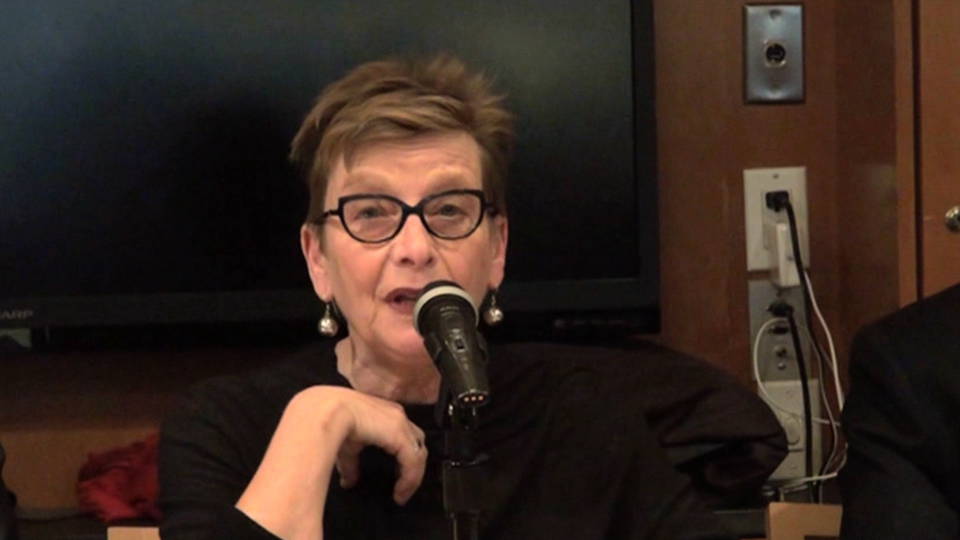
International academics are raising concern about the crackdown against their Turkish colleagues who have signed a petition denouncing the Turkish military’s violent crackdown on Kurdish communities. The petition, entitled "We Will Not Be a Party to This Crime," has been signed by more than 2,000 professors, including Noam Chomsky, Judith Butler and David Harvey. In response, Turkish President Recep Tayyip Erdogan has verbally attacked the professors. Turkish security forces have arrested more than two dozen professors on charges of spreading "terrorism propaganda." In New York City, dozens of academics held a press conference to call attention to the crackdown. Columbia University professor Marianne Hirsch spoke out.
Marianne Hirsch: "The petition that was signed by over 2,000 people, 'We Will Not Be a Party to This Crime,' merely asked the government to observe national and international law and to initiate a peace process with the populations of southeast Anatolia in this Kurdish-dominated region that they have been targeting with major acts of persecution. Almost immediately, the signatories of this petition were targeted by the Turkish government, and they were accused, as we’ve been hearing, of terrorist propaganda, investigated by their universities and otherwise harassed."
This comes as a top U.N. human rights official is urging Turkey to investigate a report that the army opened fire on unarmed civilians in the majority Kurdish town of Cizre. The shooting was captured on film by Turkish journalist Refik Tekin. The video appears to show security forces shooting at a group of unarmed people, some of whom are carrying white flags. At least two people were said to be killed. The journalist is now facing arrest on charges of belonging to a terrorist organization.
U.N. Working Group Says U.S. Should Consider Reparations for Slavery
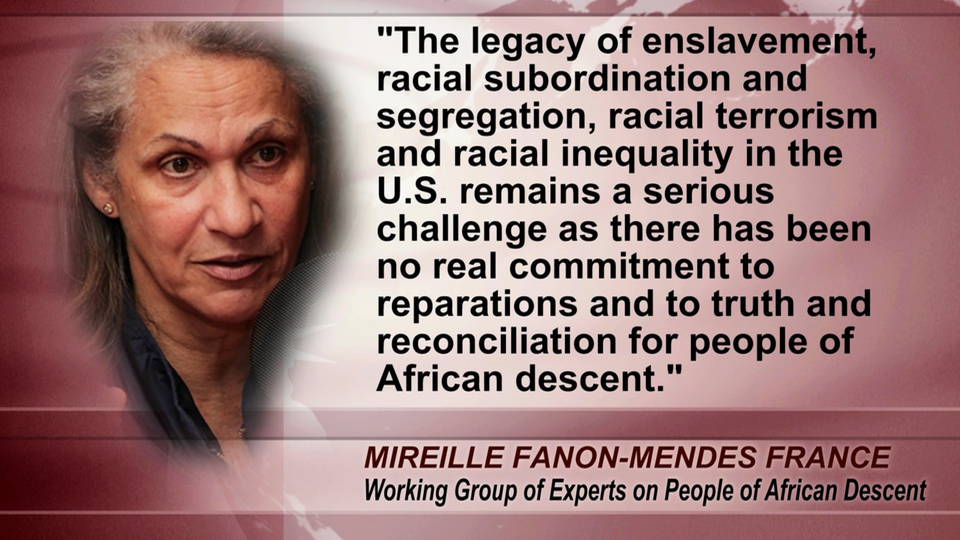
A United Nations working group says the United States should consider reparations to African Americans whose ancestors were enslaved as part of trans-Atlantic slave trade. The U.N. Working Group of Experts on People of African Descent released its recommendations after spending a week meeting with African Americans across the United States, including in Baltimore, Chicago, New York City, D.C. and Jackson, Mississippi. The fact-finding mission’s chair, Mireille Fanon-Mendès France, said, "The legacy of enslavement, racial subordination and segregation, racial terrorism and racial inequality in the U.S. remains a serious challenge as there has been no real commitment to reparations and to truth and reconciliation for people of African descent."
Report: South Sudan Faces Violence and Economic Decline

In news from Africa, a new report warns of continued violence and economic decline in South Sudan, which has been gripped by bouts of civil war since 2013. The report cites at least five violations of the ceasefire, which took effect more than a year ago. Since 2013, thousands have died in the conflict, and famine is widespread. South Sudan is the world’s newest country. It gained independence from Sudan in 2011.
India: Supreme Court Hears Challenge to Ban on Sex Between Gay Adults

In India, the Supreme Court has begun hearings in a case that could strike down a colonial-era law that criminalizes sex between gay, lesbian and transgender adults. The law, known as Section 377, was ruled unconstitutional in 2009, but it was reinstated in 2013. Hundreds of people report being arrested under the law. Activists also say there has been a surge of attacks against gay, lesbian and transgender people since the law was reinstated.
DHS to Revoke License of Berks Family Detention Center in PA

The Department of Human Services has announced it will revoke the license of the Berks Family Detention Center in Pennsylvania. This comes after a lengthy campaign by a coalition of grassroots organizations to shut down the controversial family detention center, which has housed thousands of parents and children seeking U.S. asylum. Berks is one of only three family detention centers in the United States. To see our recent report on the Berks Family Detention Center from Democracy Now! criminal justice correspondent Renée Feltz, go to democracynow.org.
OR: Protesters Face Off over Ongoing Wildlife Reserve Occupation
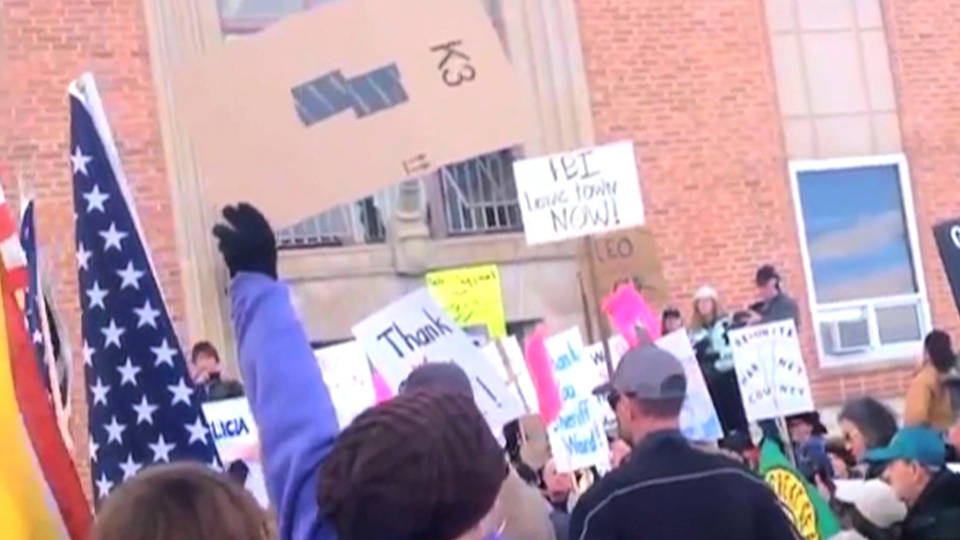
In Burns, Oregon, as many as 500 people faced off yesterday in competing protests over the ongoing armed occupation of the federal wildlife reserve. On January 2, a right-wing anti-government militia took over the wildlife refuge in support of two ranchers sentenced to prison for setting fires that burned federal land. The ranchers later turned themselves in to authorities, but militia members continued their occupation despite the protest of local residents. On Monday, both residents opposed to the occupation and some of their supporters rallied in front of the Harney County Courthouse during a tense standoff that lasted more than two hours. There are reportedly only four remaining militia members continuing the armed occupation.
Kansas Took Custody of Vet's Kids over His Use of Medical Marijuana
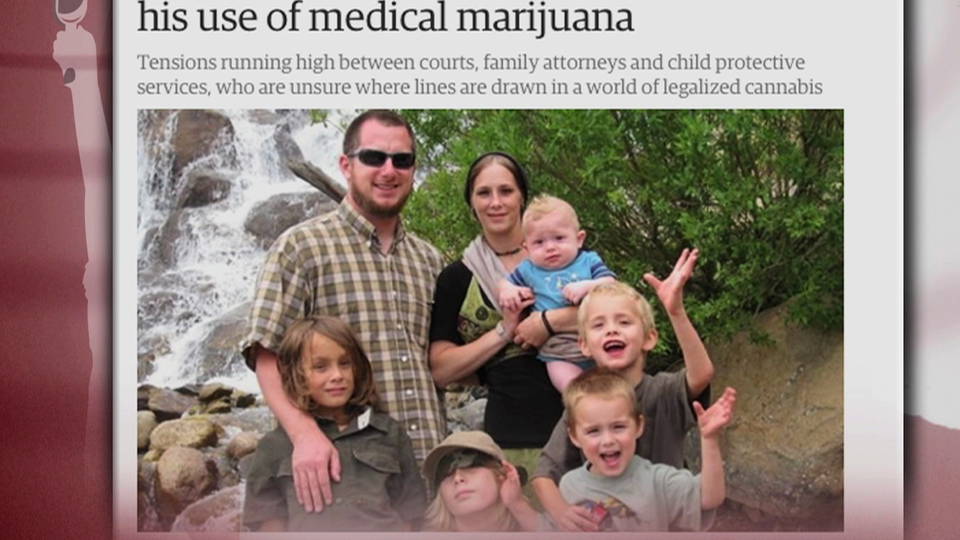
In Kansas, a U.S. military veteran is fighting to regain custody of five of his children, after Kansas took them into child custody last year over his use of medical marijuana. Raymond Schwab says he treats his PTSD and chronic pain with homemade cannabis butter. Last April, he and his wife were preparing to move to Colorado, where marijuana use is legal. But before they could finish the move, the Schwabs say the state of Kansas took their five youngest children into state custody, on suspicion of child endangerment. Even though the state later found these allegations to be unsubstantiated, Schwab says Kansas is requiring him to provide four months of drug-free urine tests to get his kids back.
Spoof Edition of NYT Distributed Across New York City
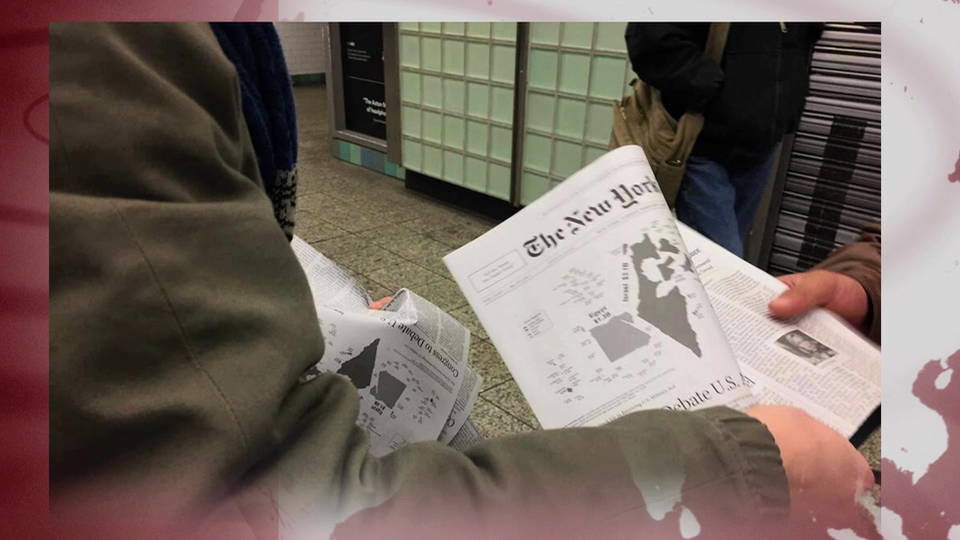
A Palestinian village has been awarded the Nobel Peace Prize, and Israel is throwing open its doors to refugees—at least, according to a fake version of The New York Times being distributed across New York City today. The prank copy of the revered "Gray Lady" also says Democratic presidential candidate "Hilarity Clifton" plans to quit the presidential race and instead head up a women’s nonprofit based in Ramallah. The edition even has fake ads. It’s not yet clear who is behind the prank. The group The Yes Men pulled off a similar prank in 2008.
Civil Rights Lawyer Myron Beldock Dies at 86
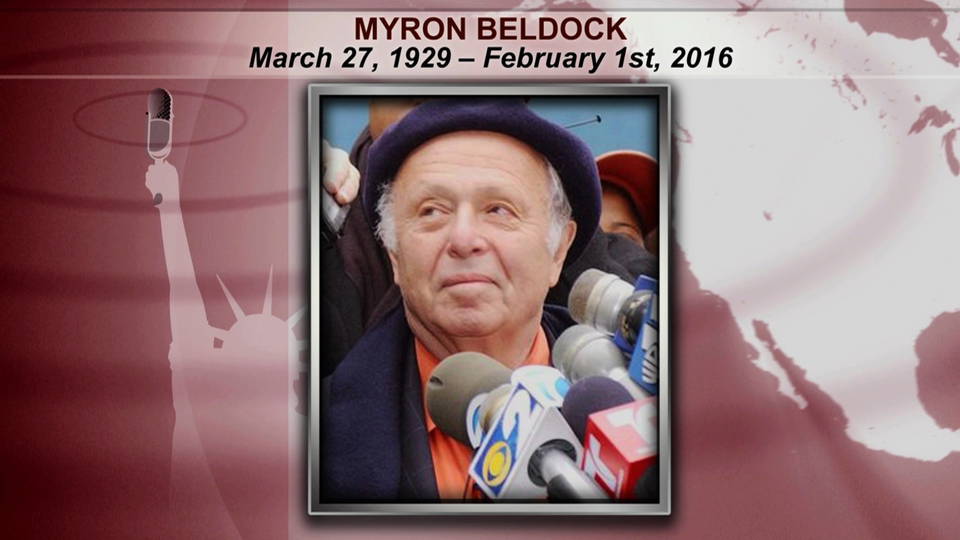
And civil rights lawyer Myron Beldock has died. Throughout the course of his legal career, Beldock championed the cases of those who had been discriminated against by the justice system. He is best known for defending Yusef Salaam, one of the five teenagers falsely convicted in the 1989 Central Park jogger case. He also defended former boxer Rubin "Hurricane" Carter, who served 19 years in prison for three murders in New Jersey, before Beldock helped win his freedom. Beldock died Monday in Manhattan at the age of 86.
Donate today:Iowa Caucuses: Cruz Beats Trump; Sanders and Clinton in Tie

The Iowa caucuses saw an upset victory for Republican Senator Ted Cruz over front-runner Donald Trump and a virtual tie between Hillary Clinton and rival Bernie Sanders. The latest returns show Clinton leading Sanders by less than half a percentage point, a result that would split Iowa’s delegate votes for the Democratic nomination. Addressing supporters, Sanders said Iowa has begun a "political revolution."
Sen. Bernie Sanders: "I think the people of Iowa have sent a very profound message to the political establishment, to the economic establishment and, by the way, to the media establishment. The powers that be—Wall Street with their endless supply of money, corporate America, the large campaign donors—are so powerful that no president can do what has to be done alone. And that is why—and that is why what Iowa has begun tonight is a political revolution."
Sanders was able to catch up with Clinton in Iowa despite polls once showing him 40 points behind. On the Republican side, Ted Cruz upset Donald Trump with the help of a strong evangelical turnout. Cruz called his win a "victory for the grassroots."
Sen. Ted Cruz: "Tonight is a victory for the grassroots. Tonight is a victory for courageous conservatives across Iowa and all across this great nation. Tonight, the state of Iowa has spoken."
We’ll have more from Iowa after headlines.
World Health Org. Declares Zika an International Public Health Crisis

The World Health Organization has declared the Zika virus an international public health emergency. While the virus itself is usually not life-threatening, it appears to be linked to microcephaly, which causes babies to be born with abnormally small heads. Microcephaly also causes a host of other health problems, including seizures, developmental delays, hearing loss and vision problems. The WHO says the Zika virus is "spreading explosively" and that up to 4 million people in the Americas could be infected by the end of this year. World Health Organization Director-General Dr. Margaret Chan spoke out at a news conference in Geneva.
Dr. Margaret Chan: "I am now declaring that the recent cluster of microcephaly and other neurological abnormalities reported in Latin America, following a similar cluster of French Polynesia in 2014, constitutes a public health emergency of international concern."
Scientists have linked rising temperatures from global warming to the increased incidence of mosquito-borne infections such as Zika.
Saudi Arabia Admits to October Airstrike on MSF Hospital
A Saudi military spokesman has acknowledged Saudi Arabia bombed a Doctors Without Borders hospital in Yemen in October. Saudi Arabia had previously denied the October 27 airstrike, which injured one person and completely destroyed the small hospital in Saada province, leaving an estimated 200,000 people without access to a medical facility. The U.S.-backed, Saudi-led coalition has been accused of carrying out multiple attacks on health facilities in Yemen in recent months. In January, an airstrike destroyed another hospital supported by Doctors Without Borders, killing at least six patients and staff. Doctors Without Borders Executive Director Jason Cone has accused Saudi Arabia of waging the ongoing war in Yemen with "utter disregard for international humanitarian law."
Afghanistan: Taliban Attack in Kabul Kills 20 Police Officers

In Afghanistan, a Taliban suicide attack near a police complex in Kabul has killed at least 20 police officers and wounded dozens more. It’s the latest in a growing string of Taliban attacks in the capital. This comes as U.S. military officials confirm that Afghan soldier and police casualties were up by nearly a third in 2015. U.S. military officials are increasing pressure on the Obama administration to change its rules to give U.S. forces a larger role in military operations in Afghanistan.
Guatemala: Former Officers on Trial for Crimes of Sexual Slavery in 1980s

In Guatemala, two former military officers are on trial for crimes of sexual and domestic slavery and forced disappearance perpetrated against indigenous Mayan women in 1982 during the U.S.-backed dirty wars. A 1999 U.N.-backed Truth Commission report found that the Guatemalan military systematically used rape as a weapon of terror during the decades-long war, but this is the first time any individual officers have faced trial related to these crimes. The trial, which opened Monday, comes after decades of organizing by the women, who say that they were forced into sexual slavery for months in the small village of Sepur Zarco in eastern Guatemala. They say they were required to report for 12-hour shifts, during which soldiers forced them to clean, cook and submit to routine gang rapes. The women are now in their seventies and eighties. Ada Valenzuela of the collective Breaking the Impunity called the trial a historic step.
Ada Valenzuela: "This is a symbolic and historic case that marks a first, not only in the history of Guatemala but also in the world, because it is the first time a national tribunal has tried a case of sexual violence, sexual slavery and domestic slavery as crimes of war, which were committed during the armed civil conflict in Guatemala."
Turkey: Crackdown on Kurdish Communities, Academics, Journalists

International academics are raising concern about the crackdown against their Turkish colleagues who have signed a petition denouncing the Turkish military’s violent crackdown on Kurdish communities. The petition, entitled "We Will Not Be a Party to This Crime," has been signed by more than 2,000 professors, including Noam Chomsky, Judith Butler and David Harvey. In response, Turkish President Recep Tayyip Erdogan has verbally attacked the professors. Turkish security forces have arrested more than two dozen professors on charges of spreading "terrorism propaganda." In New York City, dozens of academics held a press conference to call attention to the crackdown. Columbia University professor Marianne Hirsch spoke out.
Marianne Hirsch: "The petition that was signed by over 2,000 people, 'We Will Not Be a Party to This Crime,' merely asked the government to observe national and international law and to initiate a peace process with the populations of southeast Anatolia in this Kurdish-dominated region that they have been targeting with major acts of persecution. Almost immediately, the signatories of this petition were targeted by the Turkish government, and they were accused, as we’ve been hearing, of terrorist propaganda, investigated by their universities and otherwise harassed."
This comes as a top U.N. human rights official is urging Turkey to investigate a report that the army opened fire on unarmed civilians in the majority Kurdish town of Cizre. The shooting was captured on film by Turkish journalist Refik Tekin. The video appears to show security forces shooting at a group of unarmed people, some of whom are carrying white flags. At least two people were said to be killed. The journalist is now facing arrest on charges of belonging to a terrorist organization.
U.N. Working Group Says U.S. Should Consider Reparations for Slavery

A United Nations working group says the United States should consider reparations to African Americans whose ancestors were enslaved as part of trans-Atlantic slave trade. The U.N. Working Group of Experts on People of African Descent released its recommendations after spending a week meeting with African Americans across the United States, including in Baltimore, Chicago, New York City, D.C. and Jackson, Mississippi. The fact-finding mission’s chair, Mireille Fanon-Mendès France, said, "The legacy of enslavement, racial subordination and segregation, racial terrorism and racial inequality in the U.S. remains a serious challenge as there has been no real commitment to reparations and to truth and reconciliation for people of African descent."
Report: South Sudan Faces Violence and Economic Decline

In news from Africa, a new report warns of continued violence and economic decline in South Sudan, which has been gripped by bouts of civil war since 2013. The report cites at least five violations of the ceasefire, which took effect more than a year ago. Since 2013, thousands have died in the conflict, and famine is widespread. South Sudan is the world’s newest country. It gained independence from Sudan in 2011.
India: Supreme Court Hears Challenge to Ban on Sex Between Gay Adults

In India, the Supreme Court has begun hearings in a case that could strike down a colonial-era law that criminalizes sex between gay, lesbian and transgender adults. The law, known as Section 377, was ruled unconstitutional in 2009, but it was reinstated in 2013. Hundreds of people report being arrested under the law. Activists also say there has been a surge of attacks against gay, lesbian and transgender people since the law was reinstated.
DHS to Revoke License of Berks Family Detention Center in PA

The Department of Human Services has announced it will revoke the license of the Berks Family Detention Center in Pennsylvania. This comes after a lengthy campaign by a coalition of grassroots organizations to shut down the controversial family detention center, which has housed thousands of parents and children seeking U.S. asylum. Berks is one of only three family detention centers in the United States. To see our recent report on the Berks Family Detention Center from Democracy Now! criminal justice correspondent Renée Feltz, go to democracynow.org.
OR: Protesters Face Off over Ongoing Wildlife Reserve Occupation

In Burns, Oregon, as many as 500 people faced off yesterday in competing protests over the ongoing armed occupation of the federal wildlife reserve. On January 2, a right-wing anti-government militia took over the wildlife refuge in support of two ranchers sentenced to prison for setting fires that burned federal land. The ranchers later turned themselves in to authorities, but militia members continued their occupation despite the protest of local residents. On Monday, both residents opposed to the occupation and some of their supporters rallied in front of the Harney County Courthouse during a tense standoff that lasted more than two hours. There are reportedly only four remaining militia members continuing the armed occupation.
Kansas Took Custody of Vet's Kids over His Use of Medical Marijuana

In Kansas, a U.S. military veteran is fighting to regain custody of five of his children, after Kansas took them into child custody last year over his use of medical marijuana. Raymond Schwab says he treats his PTSD and chronic pain with homemade cannabis butter. Last April, he and his wife were preparing to move to Colorado, where marijuana use is legal. But before they could finish the move, the Schwabs say the state of Kansas took their five youngest children into state custody, on suspicion of child endangerment. Even though the state later found these allegations to be unsubstantiated, Schwab says Kansas is requiring him to provide four months of drug-free urine tests to get his kids back.
Spoof Edition of NYT Distributed Across New York City

A Palestinian village has been awarded the Nobel Peace Prize, and Israel is throwing open its doors to refugees—at least, according to a fake version of The New York Times being distributed across New York City today. The prank copy of the revered "Gray Lady" also says Democratic presidential candidate "Hilarity Clifton" plans to quit the presidential race and instead head up a women’s nonprofit based in Ramallah. The edition even has fake ads. It’s not yet clear who is behind the prank. The group The Yes Men pulled off a similar prank in 2008.
Civil Rights Lawyer Myron Beldock Dies at 86

And civil rights lawyer Myron Beldock has died. Throughout the course of his legal career, Beldock championed the cases of those who had been discriminated against by the justice system. He is best known for defending Yusef Salaam, one of the five teenagers falsely convicted in the 1989 Central Park jogger case. He also defended former boxer Rubin "Hurricane" Carter, who served 19 years in prison for three murders in New Jersey, before Beldock helped win his freedom. Beldock died Monday in Manhattan at the age of 86.
Follow:

TRAPping Access to Safe, Legal Abortions
WEB EXCLUSIVE

Director of Finance and Operations
Director of Development
---------------------
207 West 25th Street, 11th Floor
New York, New York 10001, United States
--------------------
--------------------






No comments:
Post a Comment